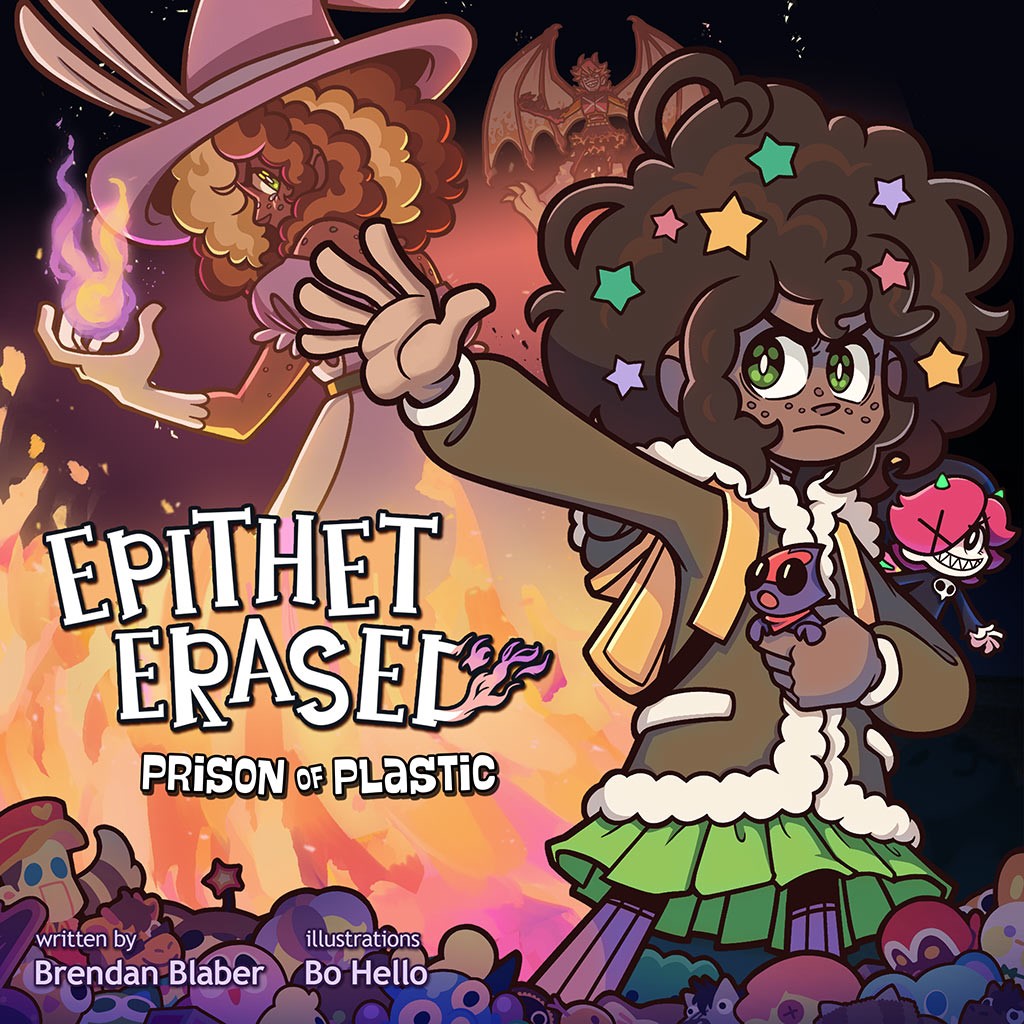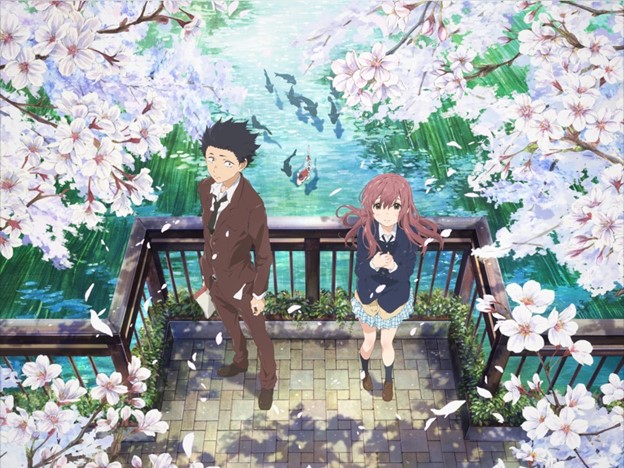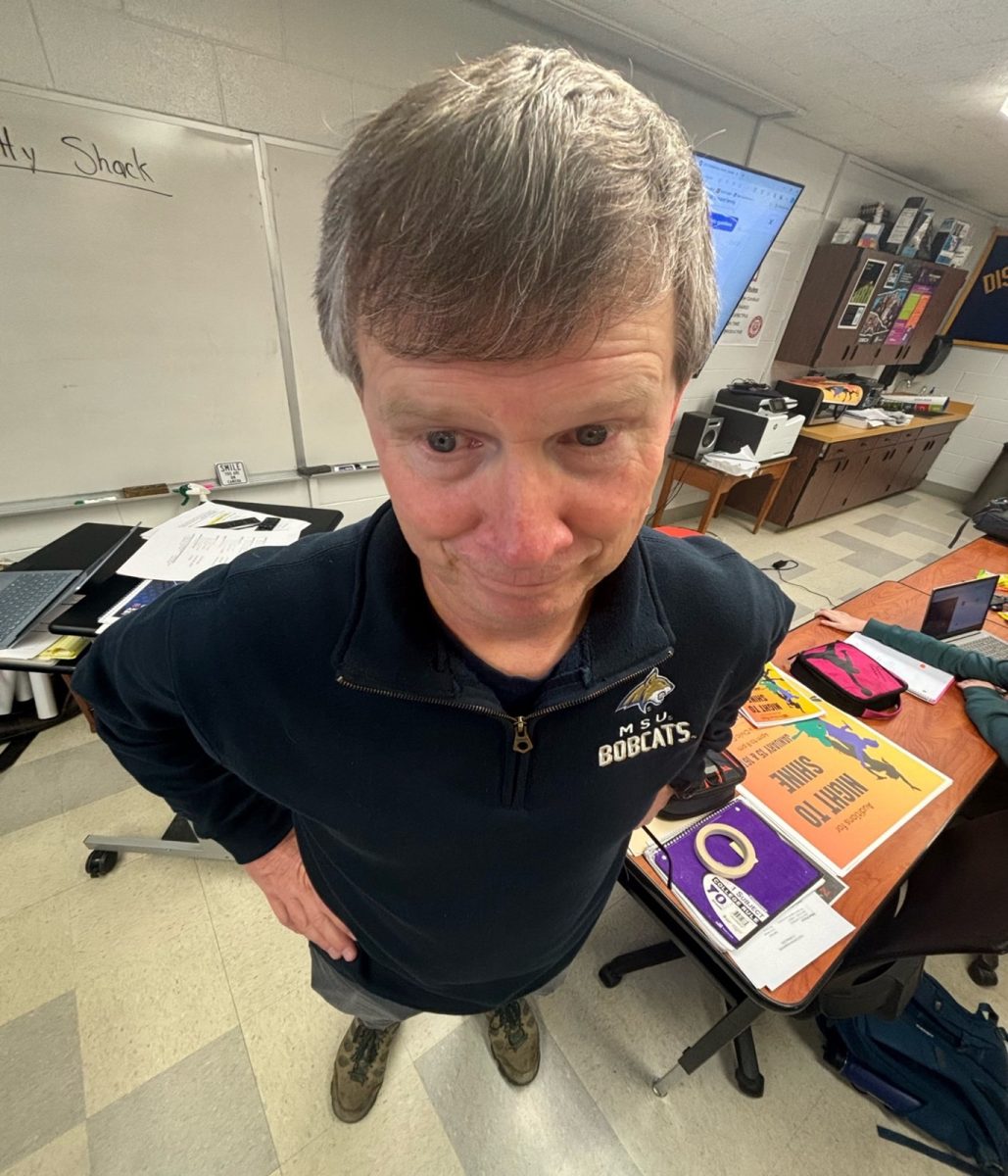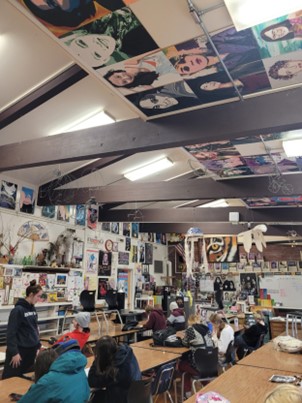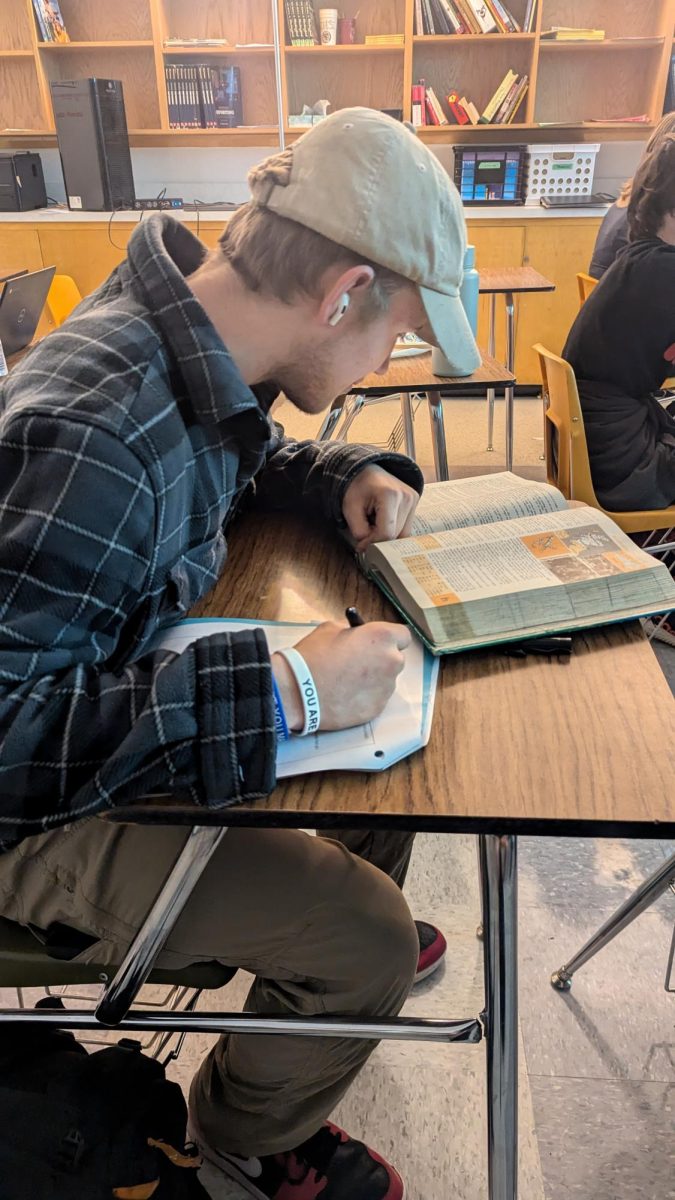I have to admit, my last few articles have been pretty dour.
The first was about a fan-created Danganronpa game helmed by an insufferable, self-righteous hypocrite. The next was about a horror game where a girl gives up everything she loves to get out of her stifling, conservative village. And the most recent article was a collaborative work about . . . them.
I shudder even just thinking about it.
I think it’s time for a palate cleanser, don’t you? Something more wholesome, more comfy!
Originally, I was going to do a funny here and segue into dissecting a dark book, probably Hell Followed With Us by Andrew Joseph White. It’s a phenomenal, uncompromisingly gruesome book about being trans that I physically cannot recommend enough, but . . . I did start actually wanting something wholesome and comfy lol.
And what just happened to fall into my lap, by way of the YouTube algorithm? The announcement that Epithet Erased: Prison of Plastic, the novel sequel to Epithet Erased, was getting a physical release, complete with a purchase link!
I immediately dropped what I was doing—typing up a table of contents document in Mrs. Dinsdale’s period 5 Basic Word class—and scooped up a copy. On the same day, I also decided to buy the audiobook version.
In case you aren’t aware, Epithet Erased is a seven-episode, American-animated series created by Brendan Blaber, voice actor and JelloApocalypse on YouTube. I’ll quickly run you through the show’s plot so we’re all on the same page before we get to the book.
One in five people in Epithet Erased are born with a thing called an epithet. An epithet is a random word linked to their very soul, like “Beach,” “Sugar,” or “Pneumonoultramicroscopicsilicovolcanoconiosis.” Epithets grant their user supernatural abilities relating to the word, and they’re very fluid. People with epithets are called “inscribed,” while the other 80% are dubbed “mundies.”
The first arc of Epithet Erased follows Molly Blyndeff, a passive, overworked elementary schooler, and Giovanni Potage, a wannabe-supervillain with a big heart.
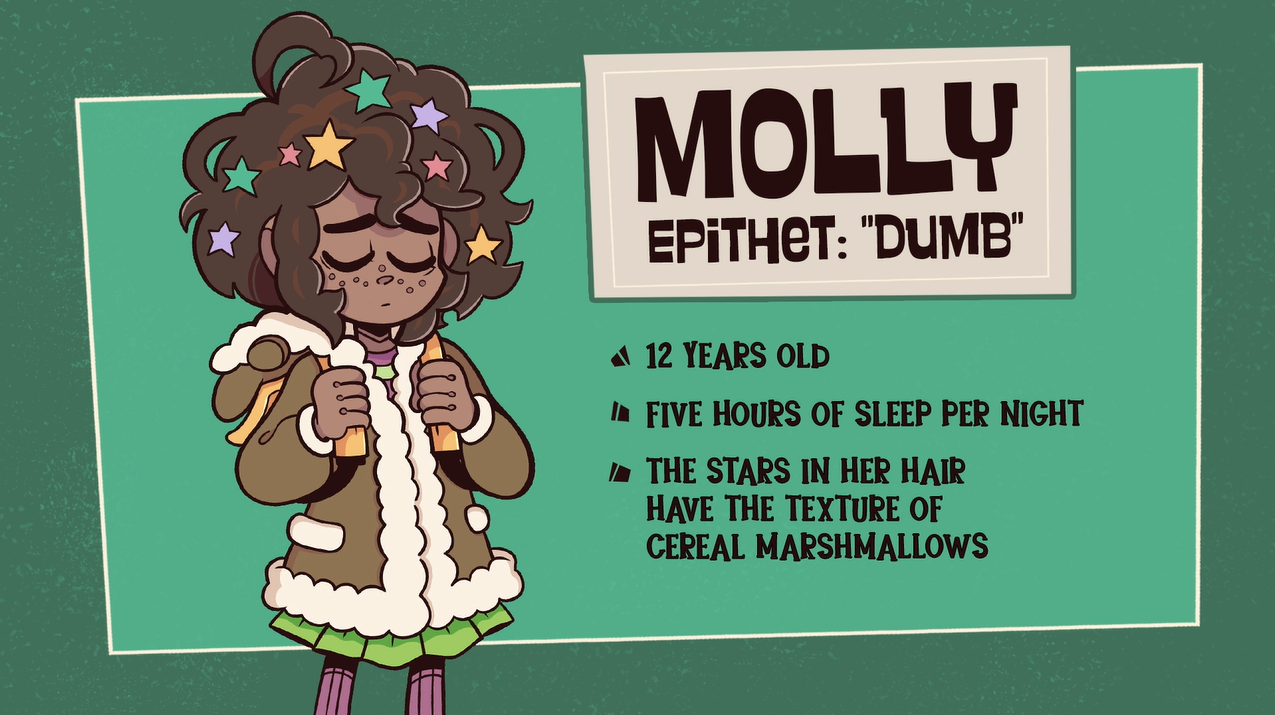
Molly’s epithet is “Dumb,” allowing her to dumb down just about anything. She can dumb people down, obviously (though she doesn’t like to, if she can avoid it), but she can also dumb down pain and mute the world around her.
Dumb also comes in handy when Molly has to deal with her older sister, Lorelai, who we will get to, believe me.
Unrelated to her epithet, Molly is also tasked with . . . doing practically all of the work to support her sister and father. She works constant shifts at their family toy store, the Blyndeff Toy Emporium; she cooks breakfast, lunch, and dinner every day; she does upkeep by sweeping, cleaning the dishes; she even does their taxes. All of that, on top of her schoolwork.
Being Molly Blyndeff is to be suffering.
Being Giovanni Potage, on the other hand, is to be on cloud nine.
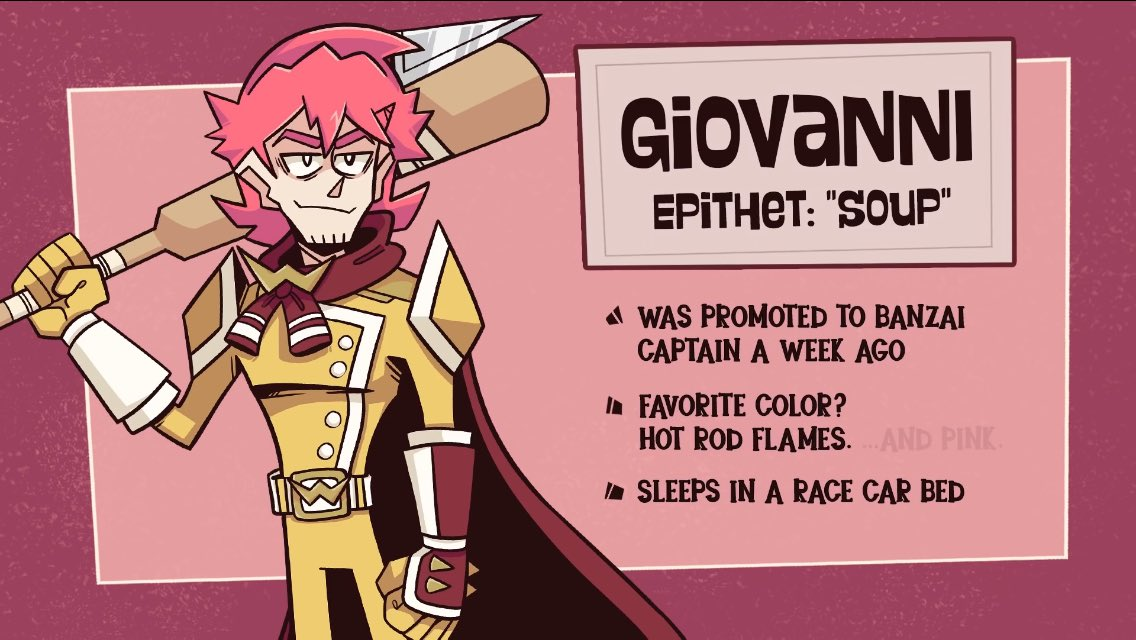
Giovanni, leader of a platoon of Banzai Blasters—a local supervillain MLM—is the guy of all time! Goofy, over-the-top, and endlessly devoted to the people he cares about, Giovanni is quite the character. His “minions”—the people he recruited to the MLM—also hold him in high regard and are loyal, an oddity among the Banzai Blasters.
Giovanni’s Epithet, “Soup,” is way more straightforward than Molly’s. It lets him manifest soup out of thin air. Giovanni can make blazing hot soup-blasts, use the soup’s steam to propel himself, and summon soupy soup smokescreens.
It’s not the ideal epithet for an aspiring villain, but it’s what he’s stuck with, and Giovanni makes do.
The main events of Epithet Erased take place in a snowy metropolis called Sweet Jazz City and revolve around a funny little trinket called the Arsene Amulet. The Arsene Amulet possesses the ability to steal another person’s epithet, and as rumor would have it, it’s somewhere inside Sweet Jazz City’s museum’s storage.
Molly winds up trapped inside the museum after-hours, on the exact night when Giovanni and his crew are breaking in to indiscriminately snatch up cool exhibits. Through hijinks involving another group that’s specifically after the Arsene Amulet, Molly and Giovanni become friends, and he inspires her to value herself more.
In Giovanni’s own words, “You’re just as important as everyone else is, Bear Trap!”
Their relationship is stupid sweet, and I love every second of it.
Get it because Molly’s epithet is Dumb and stupid is a synonym for dumb
. . . I’m very clever, shut up
After episode 4 wraps up the museum arc, Molly and Giovanni mostly exit the spotlight. I won’t regale you with what happens in the second arc, because it’s not really relevant to Prison of Plastic.
The series’ vibe toes the line between absurdly comical and genuinely sweet, all the while being very entertaining and creative. In the show’s many fight scenes, the characters not only have to come up with effective ways to use their own epithets, but also improvise how to counteract those of their enemies’. None of the solutions feel half-baked, or just a way to get to the next scene, nor do the characters just default to easy answers.
Theoretically, Molly could just dumb down any person attacking her until they’re too stupid to function, easily winning any fight, but the series doesn’t go that route.
Combine that with the expressive artwork, the equally expressive voice acting, and its tabletop RPG-like, cut-out puppeteering animation style, and Epithet Erased cements itself as something unique and superbly loveable.
Not perfect by any means, but it’s absolutely worth your time. If you want to watch the series, all seven episodes are free on YouTube.
Now it time for book!!!!!!!!
Epithet Erased: Prison of Plastic picks up a week after the events of the show, with a series of four prologues.
Prologue A: The Neo Trio reintroduces us to Molly, who’s currently panicking. It’s one of her rare days off from manning the toy store, and Molly’s two best friends are intent on spending the day with her at the local beach. Those friends are:
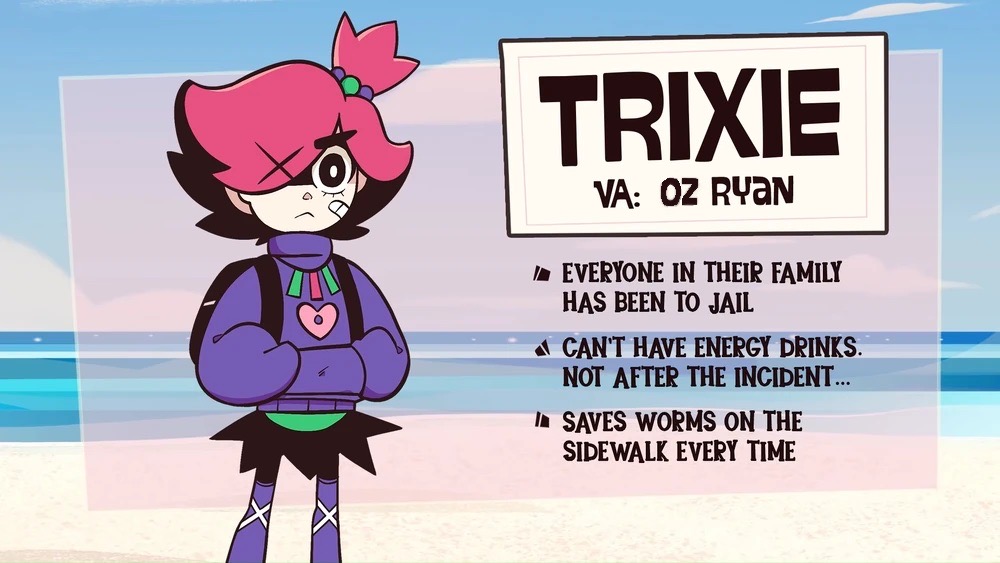
Bellatrix Roughhouse (She/they), despite being the youngest of the infamous Roughhouse thug family, is very sweet. They love brewing potions and all things spooky, ghosts especially. They’ve even managed to interact with some of the ghosts around town! Ghosts are rather annoying, as it turns out, and they tend to get clingy when they realize that Trixie can see and communicate with them.
Trixie believes this ghost-communing power of theirs is an epithet, just one she hasn’t figured out the word for.
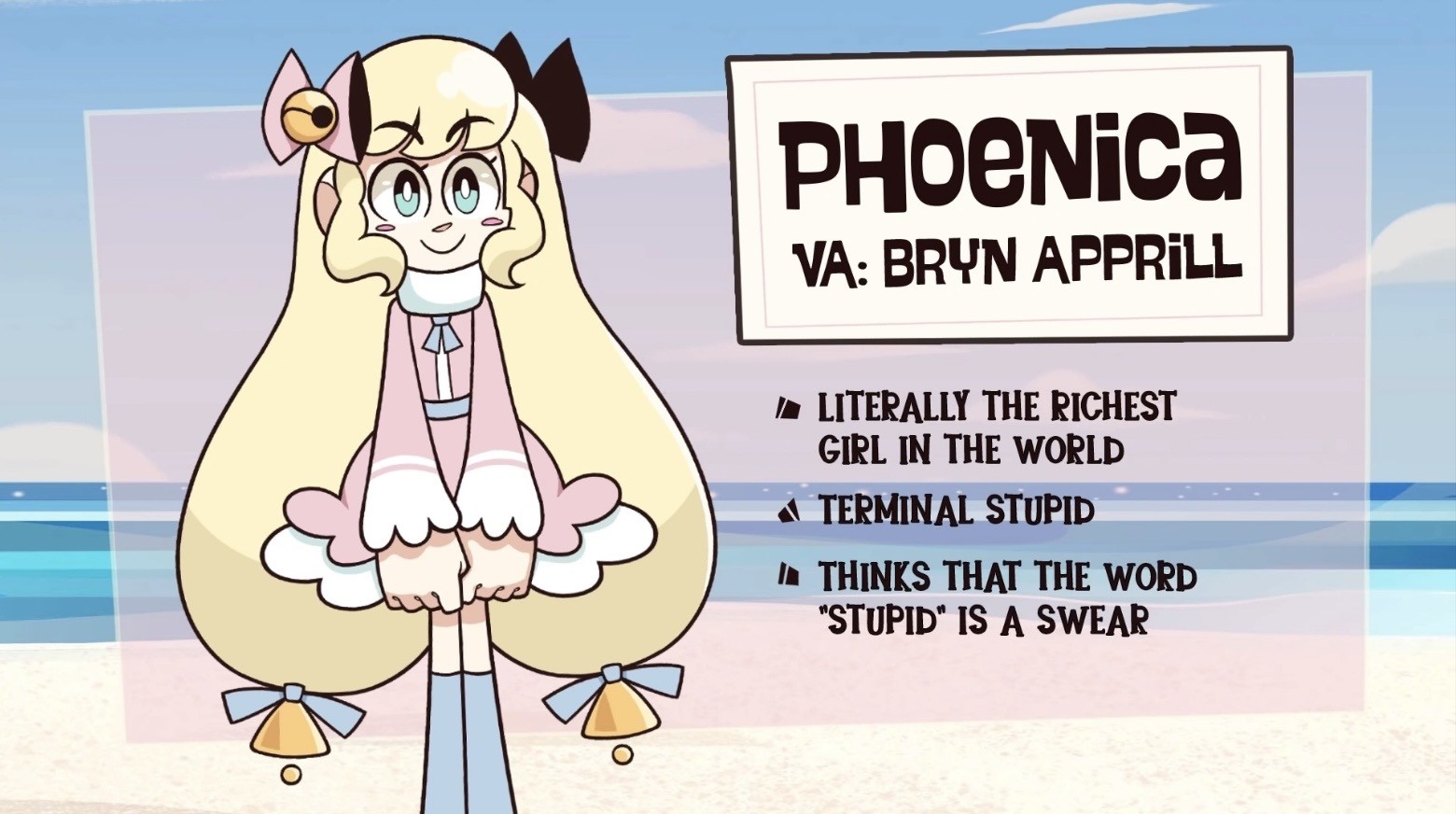
Phoenica Fleecity XV, on the other hand, is a wildly rich but naive mundie girl. The polar opposite of Trixie, Phoenica is completely averse to spooky things. She won’t even drink pumpkin spice lattes because of their relation to pumpkins, and therefore, to Halloween.
Phoenica also . . . doesn’t seem to care when she’s in danger? She doesn’t have a fight or flight response. It’s like she doesn’t even register it. Like, Phoenica could be threatened at knifepoint by child murderer extraordinaire William Afton himself and she wouldn’t be concerned in the slightest.
And yes! In the Prison of Plastic audiobook, she does share a voice actor with Kobeni Higashiyama from the English dub of Chainsaw Man!
Molly, Trixie, and Phoenica’s friendship is explored thoroughly over the course of Prison of Plastic, and you can feel how much they care for each other, despite their great differences. Like how Phoenica has an alarm set so that she remembers to switch the pronouns she uses for Trixie, or how Trixie offers to let Molly stay at their house after the events of the book without a second thought.
Speaking of the events of the book, after checking out a nearby alleyway, Molly manages to find Phoenica. She’s being mugged, but just . . . isn’t concerned. Instead, she’s passionately preaching to her attacker about the homework of Molly’s she was supposed to deliver. Molly ends up in the mugger’s line of sight, and she’s threatened too. Dumb doesn’t really work as a weapon, so the two are in real danger.
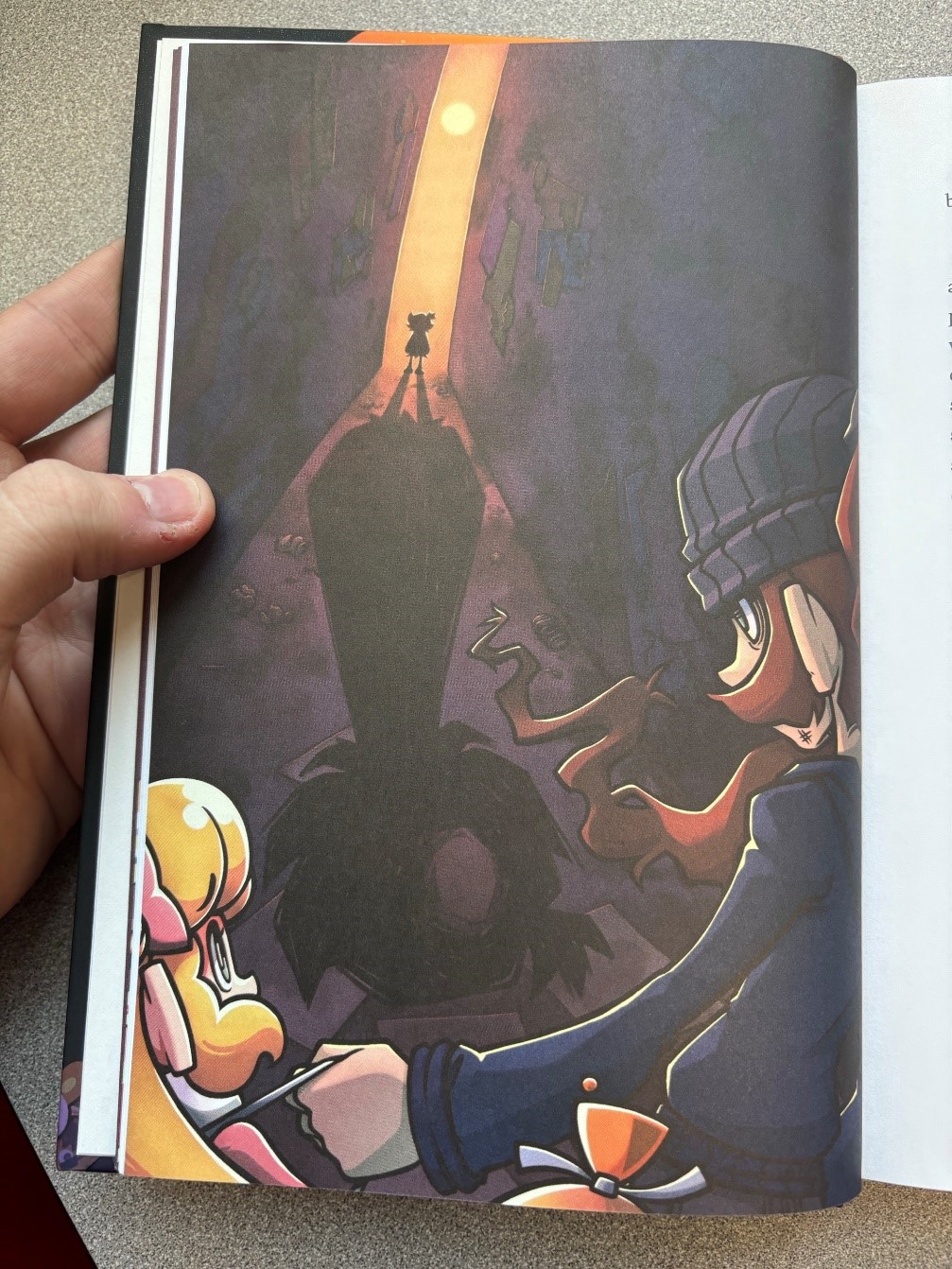
That is, until Trixie appears. Using her family’s reputation and brandishing a bulk order of box cutters (from Costco, if I had to hazard a guess; everything comes in bulk there), they intimidate the mugger into fleeing the scene.
After that, the Neo Trio reconciles, and they finally get to head to the beach.
Prologue B: The Banzai Blasters is the shortest of the bunch, and it catches us up with Giovanni. He’s decided to leave the Banzai Blasters, disillusioned with them after the show. He intends to reinvent himself as an all-new villain and he’s brought his beloved minions together to discuss this.
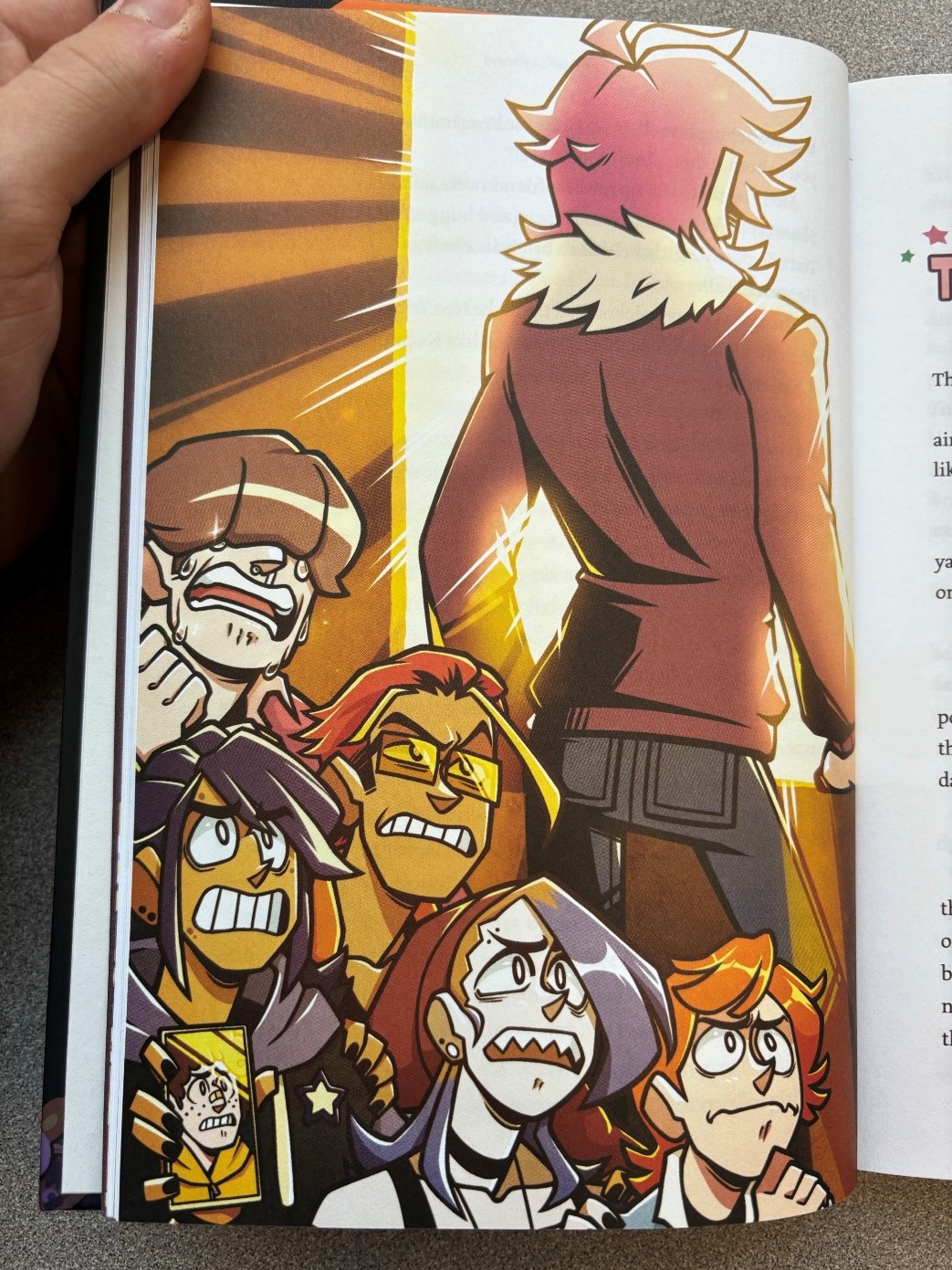
They take it surprisingly well! They’re not particularly invested in the Banzai Blasters as an organization; they were in it because Giovanni was. If he’s leaving, they have no qualms about jumping ship and following him into whatever villainous exploits he has planned next.
Spirited, Giovanni announces their next dastardly scheme is happening that Friday!! However, since it’s on such short notice, none of his minions are free. Most of them are attending Flamethrower’s cheer competition that day, except for Car Crash who can’t help either because he’s grounded.
Giovanni, though inconvenienced, has no issue with this turn of events. After all, he has one last minion waiting in the wings.
Prologue C: The Rabbit Knight is complete tonal whiplash. Taking place a few hours before the other prologues, it smash-cuts to a land devoid of life, scorched dead long ago.
Under a crimson sky, the titular Rabbit Knight engages in a fateful battle against a giant dragon made of s’mores. Ten long years ago, this dragon massacred the Rabbit Knight’s village. After a decade of preparation, the Rabbit Knight has returned to enact just revenge against the monster.
The dragon cackles, mocking the knight by reminding her of the people it killed. Not just the Rabbit Knight’s community, but the many, like her, who’ve tried and failed to avenge their loved ones.
The knight remains unfazed, however, and draws the legendary Sword of the Eclipse, and reveals herself as the last Eclipse Lunarian.
The s’more dragon falters. It assumed the Eclipse Lunarians had been wiped out over a hundred years ago, but it was wrong.
Unleashing the Secret Lunarian technique Mochi Moonbow, the Rabbit Knight readies herself to fire the Sword of the Eclipse into the dragon, to pierce its malice completely. As the beast cries out in fear that this is “THE ULTIMATE MOVE!”, the battle is disrupted.
Molly suddenly enters the scene, and both actors freeze.
Now you might be asking, how and why is Molly here? Well, as it turns out, the Rabbit Knight was SUPPOSED to do the dishes today. But she didn’t, and Molly had to do it, and now Molly won’t have enough time to prepare dinner or do her homework!
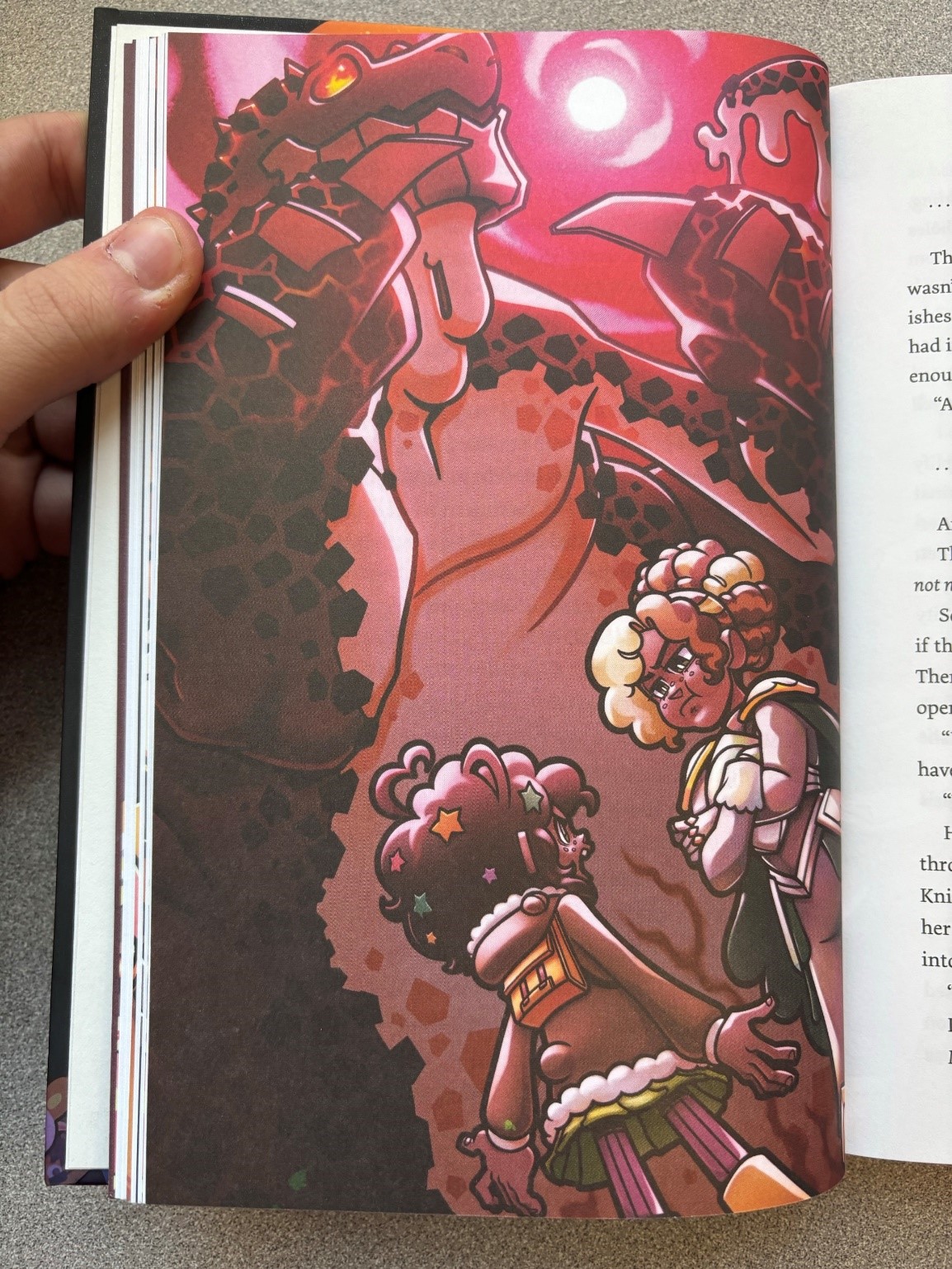
The Rabbit Knight’s true identity is that of Lorelai Blyndeff, Molly’s older sister that I mentioned before. This world, its history, the story of the Lunarians, the tragedies the s’more dragon caused—they were all created by Lorelai, brought to life with her epithet: “Augment.”
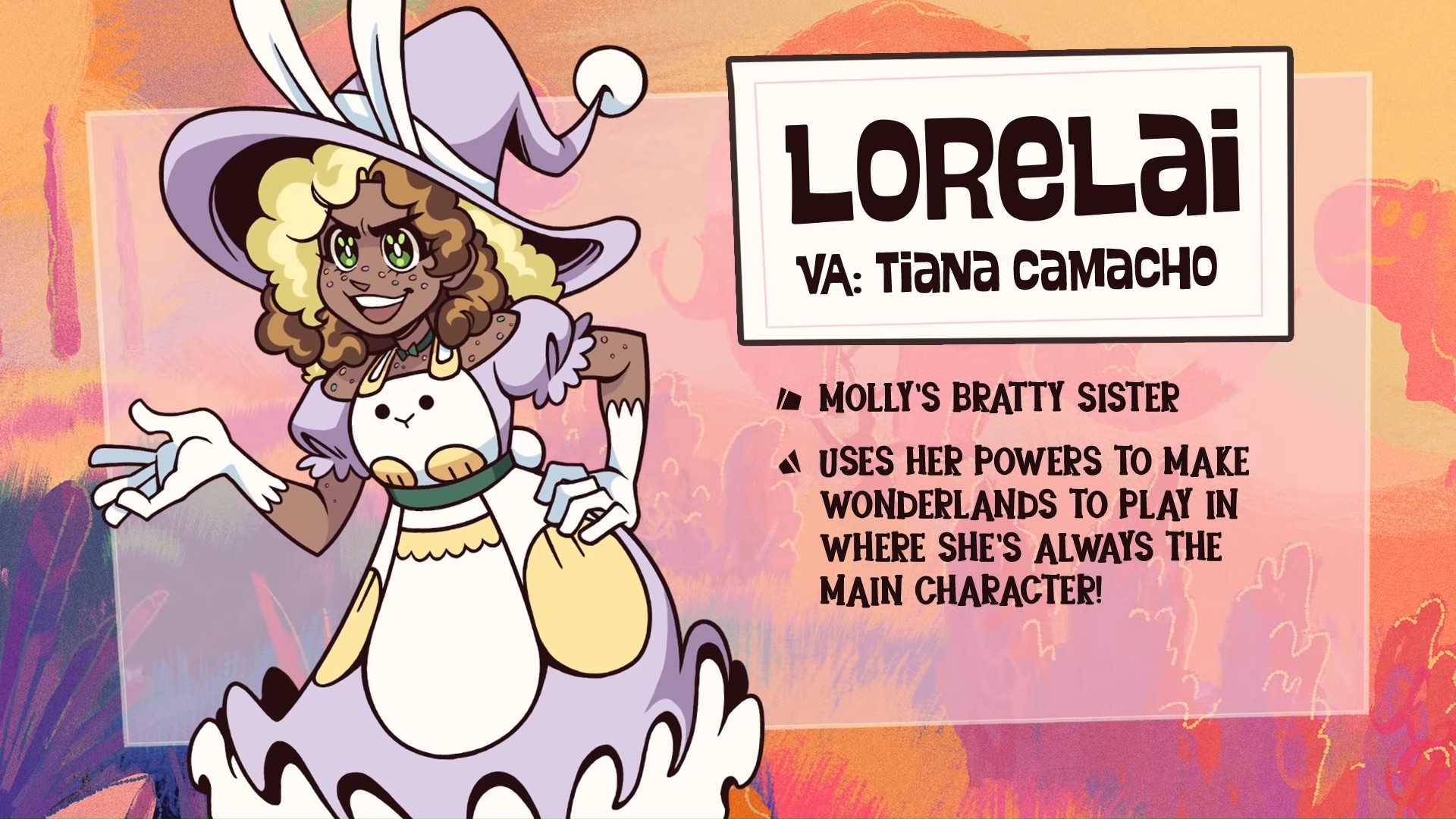
Augment allows Lorelai to augment reality itself: to add and adjust parts of it to her liking. While this insane power could be catastrophic in malicious hands, Lorelai mostly uses it to construct pocket worlds for her to LARP in. From the outside, these worlds appear as glowing bubbles, and they’re nigh impenetrable.
Molly’s epithet is the exception.
Dumb can dumb down the things made with Augment to their barest concepts, then further simplify those concepts into nothing. This includes the boundaries of the dream bubbles, to Lorelai’s continued dismay.
As is common when Molly intrudes, the sisters begin to argue. Molly is angry with Lorelai for skimping out on her chores, while Lorelai complains about Molly ruining her fun. Lorelai eventually gets her sister to leave by cruelly reminding the girl that their dad, Martin Blyndeff, definitely prefers his older daughter. It cuts deep.
The Rabbit Knight is left alone, free to continue the Lunarian story. But she can’t: in her own words, ”the mood is shot.” With a finger snap, a frustrated Lorelai deletes the s’more dragon, and starts constructing a new world.
Prologue D: The Instructor is the last prologue, and the most interesting worldbuilding-wise. The instructor in question is this green twink:
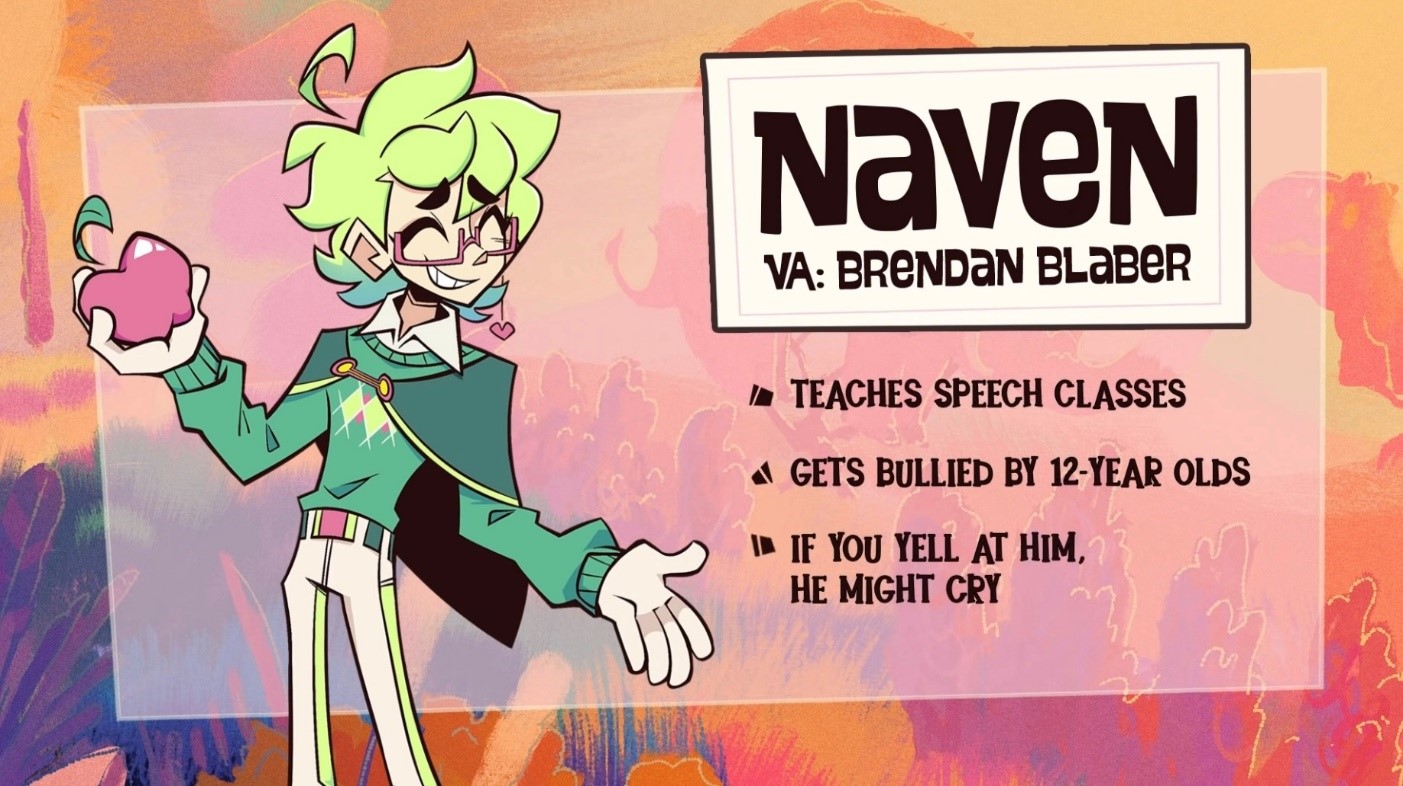
Naven Nuknuk, the sickly Victorian boy CEO of the STEM megacorporation. STEM is basically the Amazon of the Epithet Erased world, with its fingers in the pies of a multitude of industries. But unlike your average Jeff Bezoses, Naven actually cares about the wellbeing of his employees.
Unrealistic. Magical powers are fine, but CEOs being decent people? My suspension of disbelief can only be stretched so far.
Naven also, interestingly, has STEM prioritize mundie applicants over inscribed. Being a mundie himself, it makes sense, but it’s still a notable oddity in a world where epithets exist. Any other company would be frothing at the mouth to hire someone like Lorelai, but STEM prides itself on being different. There are plenty of people who are smart and perfectly capable, but are passed over because they don’t have epithets, and Naven recognizes that.
Today, though, Naven has something independent of his CEO duties to attend to. A regular speech class for a certain trio of elementary schoolers he was too nice to say no to. I bet you can guess who they are.
Like any member of the 1%, Naven has a drove of chauffeurs to drive him whenever he needs to go someplace. His chauffeur for today is described as “a gothy-looking chick” with “ebony hair with purple streaks.”
. . . A goth girl with ebony hair and purple streaks, you say?
Take a moment, if you will, to look at my author profile.
I am going to GET YOU JELLO
Naven, driven by Ebony Dark’ness Dimentia Raven Way, speeds to the Blyndeff Toy Emporium. The ride is bumpy, to say the very least, but they make it there in one piece. As Naven gets out, the goth chauffeur muses, in a clever bit of foreshadowing, “What could possibly happen at a boring old speech class?”
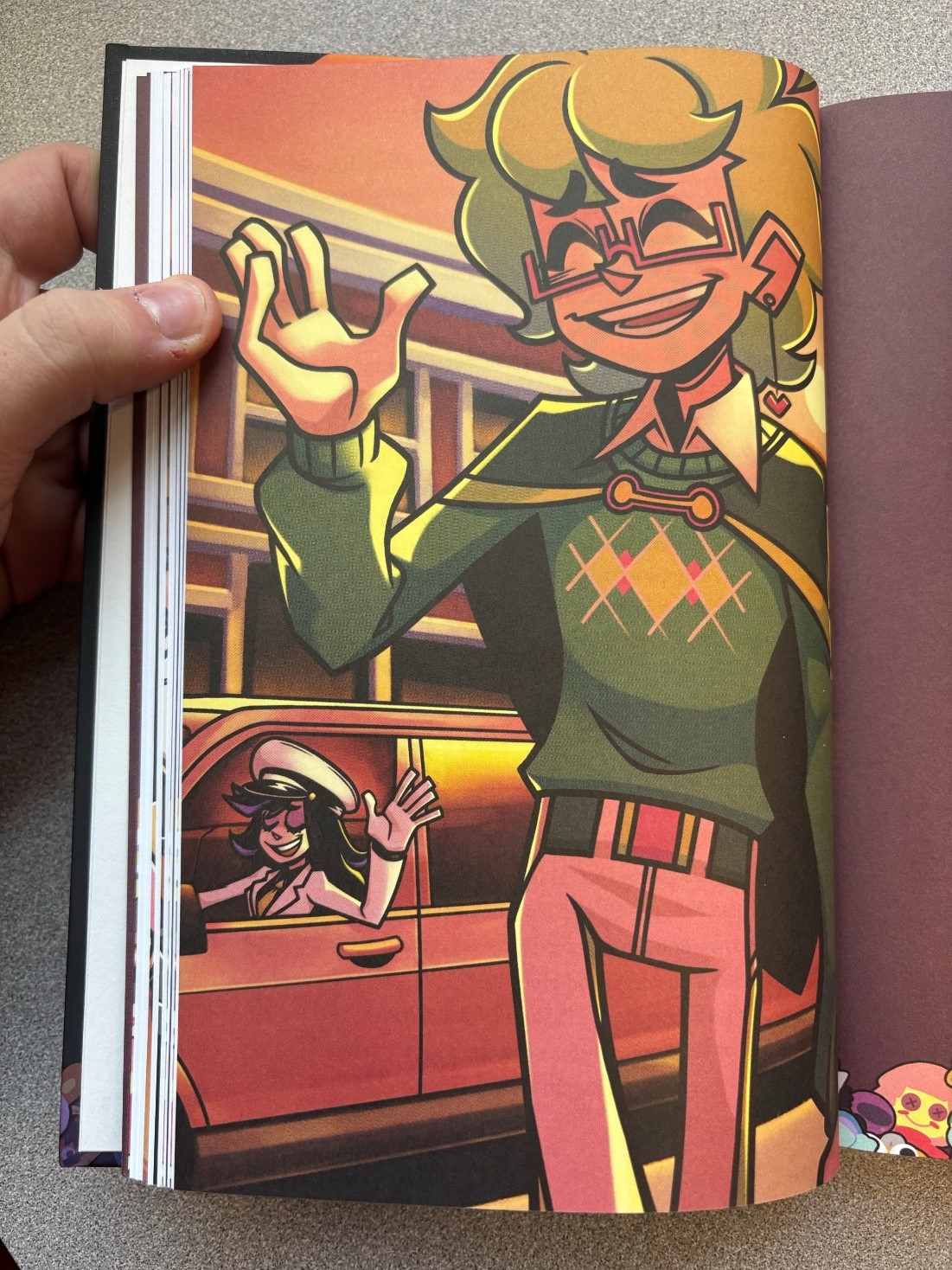
Unrelated, but . . . what’s going on with Naven’s legs in this photo?
One thing that I’m really happy about with Prison of Plastic is the increased number of mundie main characters. Over half of the new characters it introduces (there’s one more we’ll get to but just know that he has an epithet) do not have epithets. While Trixie’s inscribed status is up in the air, both Phoenica and Naven are completely epithetless.
Only having characters with magic powers would open up the possibilities for creative action setpieces, yes—but it would make the world feel way smaller (remember, inscribed are only 20% of the population), and restrict the amount of social commentary the story would be able to go into. And Epithet Erased is clearly interested in doing that, as shown by the discussion of employment in Prologue D.
Talking about how regular people are discarded because of their lack of powers wouldn’t hold much weight if none of the main characters were regular people, y’know?
For additional context, the original Epithet Erased show had very few mundie main characters. All the protagonists had epithets, and so did all the minor and major antagonists of each arc. Molly, Giovanni, Percy, Ramsey, Mr. Barrier, Mera, Sylvie, Markdown, Bugsy, and Zora—not one of them is a mundie.
The only mundies who had any real importance to the story were Martin Blyndeff, Car Crash, and Howie Honeyglow. However, Martin and Howie only appear in one episode each, and Car Crash in a grand total of two.
So, Prison of Plastic expanding that roster and making the regular people it adds important, is great!
Chapter 1: Fish Out of Water introduces our last major player. Cutting back to the Neo Trio’s beach trip, they find an unconscious man washed up on the shore! I hate it when that happens.
Naturally, Molly, Trixie, and Phoenica all freak out, which wakes the man. The man, Rick Shades, joins the elementary schoolers in their screaming.
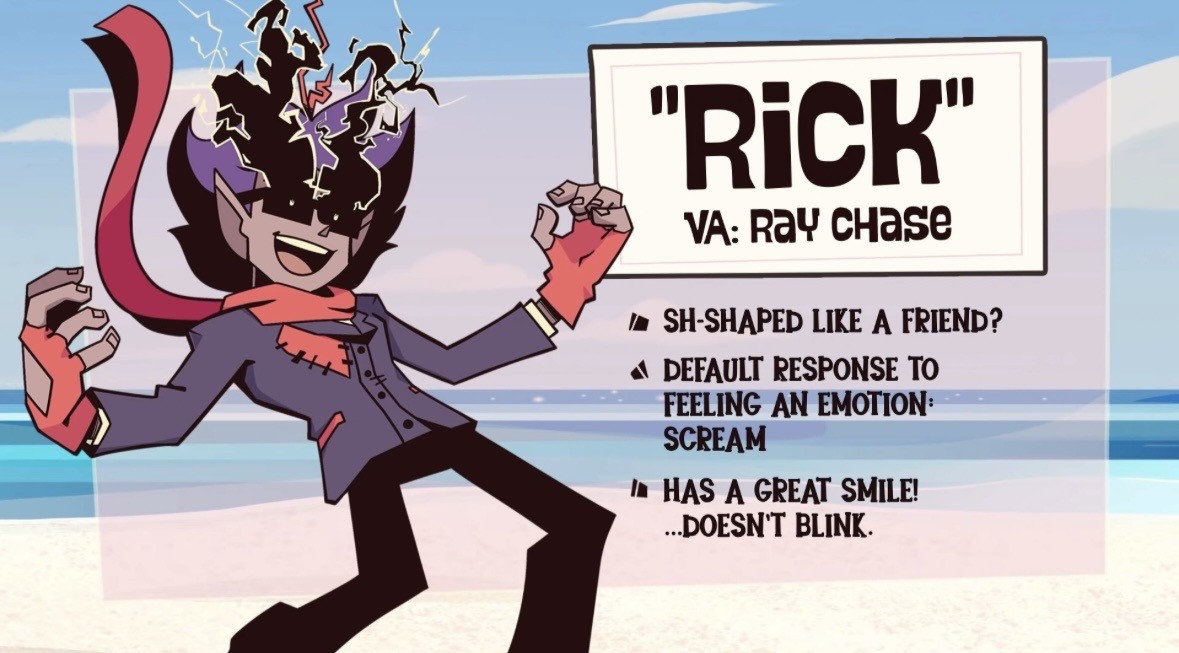
Hailing from Ocean Country, an undersea society that’s strictly no-contact with the surface world, Rick is . . . The best way to describe him is that he’s always on. And I mean that in a good way! He’s a cackling dark wizard obsessed with friendship in the most ominous, loud manner possible. He’s unnerving and weird and I love him to death.
Rick really gives Lorelai a run for her money for being my favorite new character.
Rick’s epithet is “Soulmates.” It has nothing to do with romance, as you might first assume. Soulmates allows Rick to do whatever his friends can do, with said friendships being confirmed via black magic.
Molly and Trixie are wary of this mysterious man they found on the beach and whom they have no information on, but Phoenica isn’t all that concerned! In fact, she goes as far as to befriend Rick, and we get to see his epithet in action.
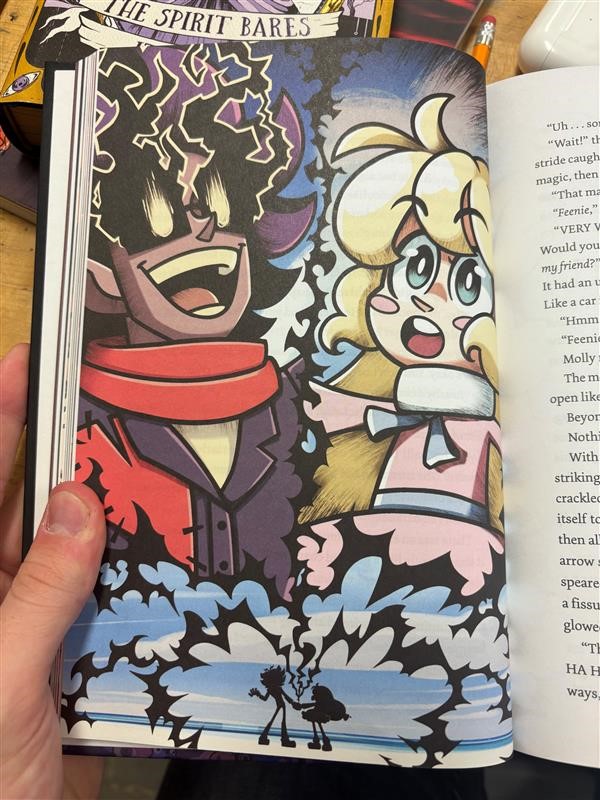
Rick tries to coax Molly and Trixie into becoming his friends too, but they’re rather resistant to the idea. Which is entirely understandable! Womp womp Rick. The warlock is not deterred, however, and announces that . . . they’ll be friends with him eventually, punctuated with a maniacal laugh.
The conversation turns to the fact that Rick has not eaten or drunk anything for several days. Molly finds some apple lip balm in her pocket, which he takes a big chomp out of.
Rick then immediately drops into the coarse sand, unconscious.
Molly, Trixie, and Phoenica panic, before they collectively decide to bring him to the Blyndeff Toy Emporium. They had a speech class with Naven today, so he should be there! He could help Rick, couldn’t he?!
Chapter 2: Vincent Murder sees Naven sitting alone in the toy store. He helps ring up Sylvie in his only appearance in the book and talks with Lorelai a bit when she peeks out of her bubble, but it’s rather uneventful. Naven starts to worry when his students don’t appear, but he lets out a sigh of relief when they drag a corpse into the toy store.
Here, another worldbuilding detail is brought up: ethnicity.
Rick, as we know, is from Ocean Country, and his heritage is apparently plainly visible. As Naven explains on page 77, “People with Ocean race in their veins could be easily identified by their brightly colored hair and striking eyes. If a person’s hair was a shade of neon pink, green, purple, or blue, then at least one of their ancestors was probably from Ocean Country.”
Ocean Country isn’t the only biome we learn about in Prison of Plastic. Naven runs them through his head: there’re Taiga, Deepwood, Desert, and Island Countries. Like Ocean, they all have their own distinct traits visible in their population. Naven says that Phoenicia is wholly Taiga, Molly is both Taiga and Deepwood, and Trixie is Taiga too, but with a splash of Ocean.
While it’s a small thing, it makes the world of Epithet Erased feel more whole.
In the toy store, Naven inspects Rick, and after getting some fresh water in his system, the twink teacher concludes that Rick should be fine. Naven plans to call an ambulance when the man of the hour BURSTS into the Blyndeff Toy Emporium to see Molly!
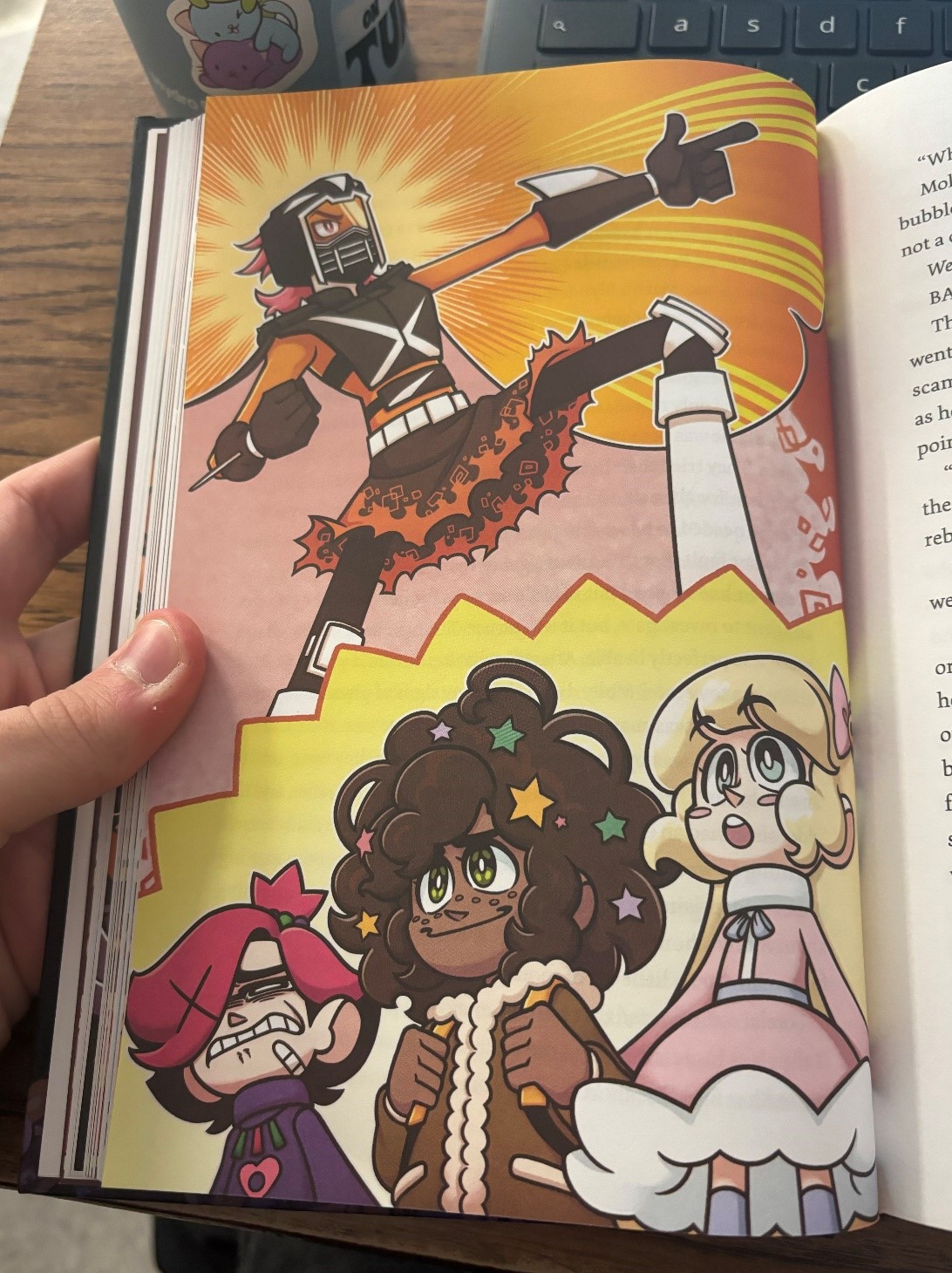
VINCENT MURDER!
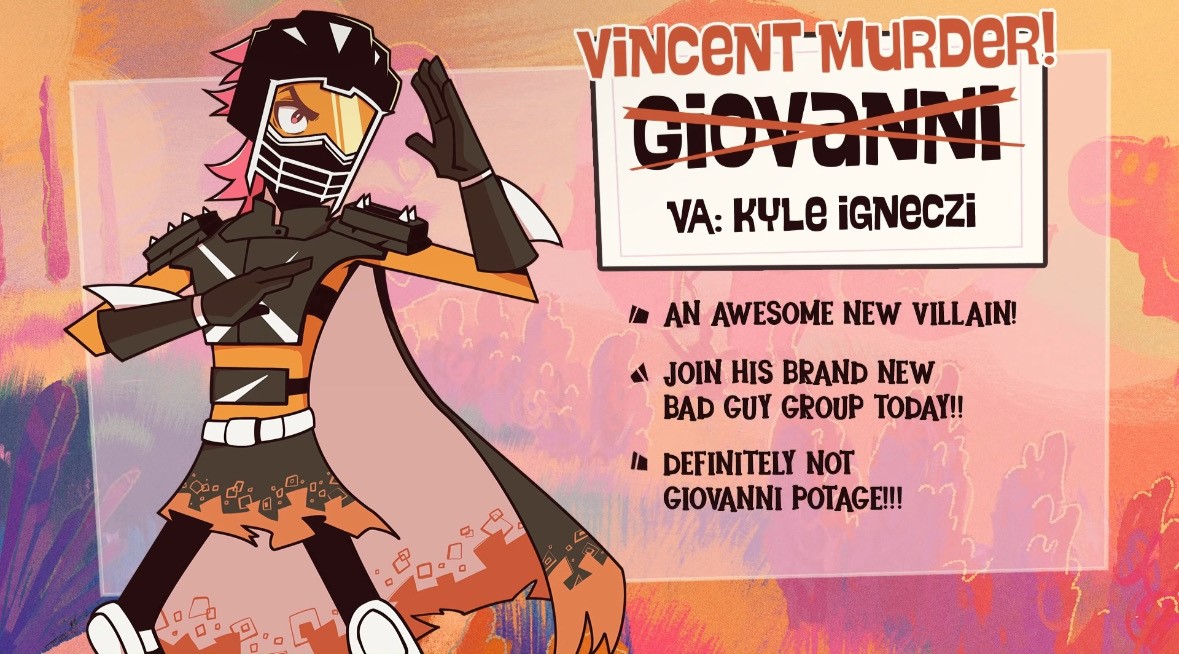
Bo Hello really ate with this redesign. Mustard yellow is not Giovanni’s color.
While, at first, Giovanni gushes proudly that Molly committed her first murder—”Little villains grow up so fast!”—once his minion explains the situation, he creates some nutritious soup for Rick to eat.
Once color starts returning to the half-alive man’s face, everyone breathes in sighs of relief. Molly introduces Trixie, Phoenica, and Naven to Giovanni, and vice versa, whereupon she learns that Trixie and Giovanni are actually cousins, Giovanni discusses his next diabolical plan, and everyone generally has a good time!
It’s nice. All of Molly’s loved ones are all here, together, and having fun. It’s loud . . . but in a good way, for once.
With all our main characters assembled, Lorelai pops out of her bubble, having been disturbed by the noise. She quickly falls head-over-heels for Giovanni (SO VALID QUEEN) and stumbles through an attempt to flirt with the shark-toothed goof. Lorelai tries to nudge Molly into recommending her for minionship—something her sister obviously has no interest in doing—but ultimately, Giovanni decides to test her aptitude instead.
He needs to determine whether she has the ambiguous “most important thing a minion can have,” and if she does, Lorelai can skip the recommendation phase of her application altogether.
Lorelai assumes this “most important thing” must be being adequately evil. Immediately having an idea, she drags everyone in the toy store into her newest world: the sugary-sweet Ableglow Bramble, where she takes the mantle of the Glinda-the-Good-Witch-esqe Hare-idan. Taking Naven hostage and whisking her crush to the deepest part of the bramble, Lorelai prepares to ace her minion exam and win Giovanni’s heart.
With her boss and teacher in the palms of her wicked sister, Molly, her friends, and also Rick have to traverse the Ambleglow Bramble and overcome the traps and trials therein before it’s too late.
From there, Prison of Plastic intermittently switches between these two perspectives: Lorelai toiling at the minion test—to make cookies without using her epithet—with Naven keeping an eye on her, and the Neo Trio + 1 contending with creative obstacles, while Rick tries time and again to become friends with Trixie and Molly.
The plot is fun and full of energy, yet is able to slow down for its emotional moments. It recaptures the energy of the original Epithet Erased show, something I was definitely concerned about going into Prison of Plastic. I enjoyed it so much that I even did my Semester I English 4 one-pager on it!
And the Soundbooth Theater audiobook makes it even better. Narrated by Blaber himself, and with all of the returning characters voiced by their original VA’s, the audiobook is without a doubt the best way to experience Prison of Plastic. While I love my hardcover copy and its illustrations to bits, the audiobook is 100% the way to go. It’s only $12 too, so it’s not a big financial sink.
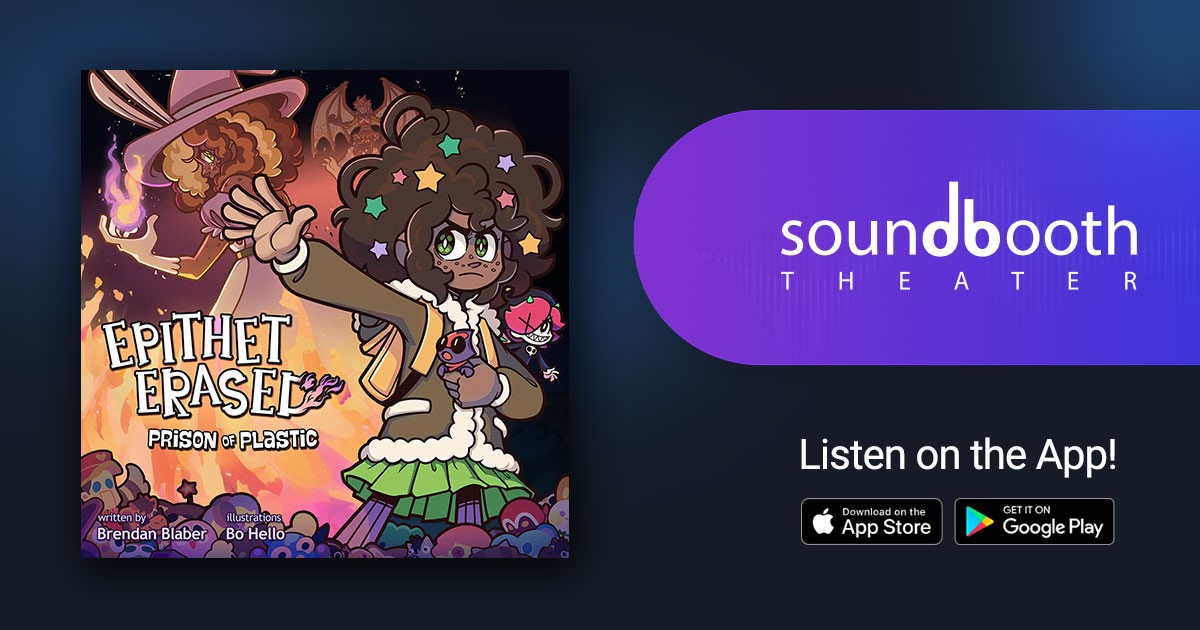
It’s also like ten hours long so that definitely helps.
Does Prison of Plastic have flaws? Oh, without a doubt. Some of the characters really pale in comparison to the standouts, and the comedy, like the original show’s, isn’t for everyone. It certainly hits for me, but I am not everyone. It’d be rather concerning if I was.
If this article made you interested in Prison of Plastic, here’s where you should stop reading. From here forward, if you choose to scroll down, are my spoiler-filled thoughts on the novel, its more notable characters, and my critiques, so you’d better BOOK it if you haven’t read it but want to.
First up to bat is Molly. She’s the protagonist of the book, so it’s only natural that we start with her.
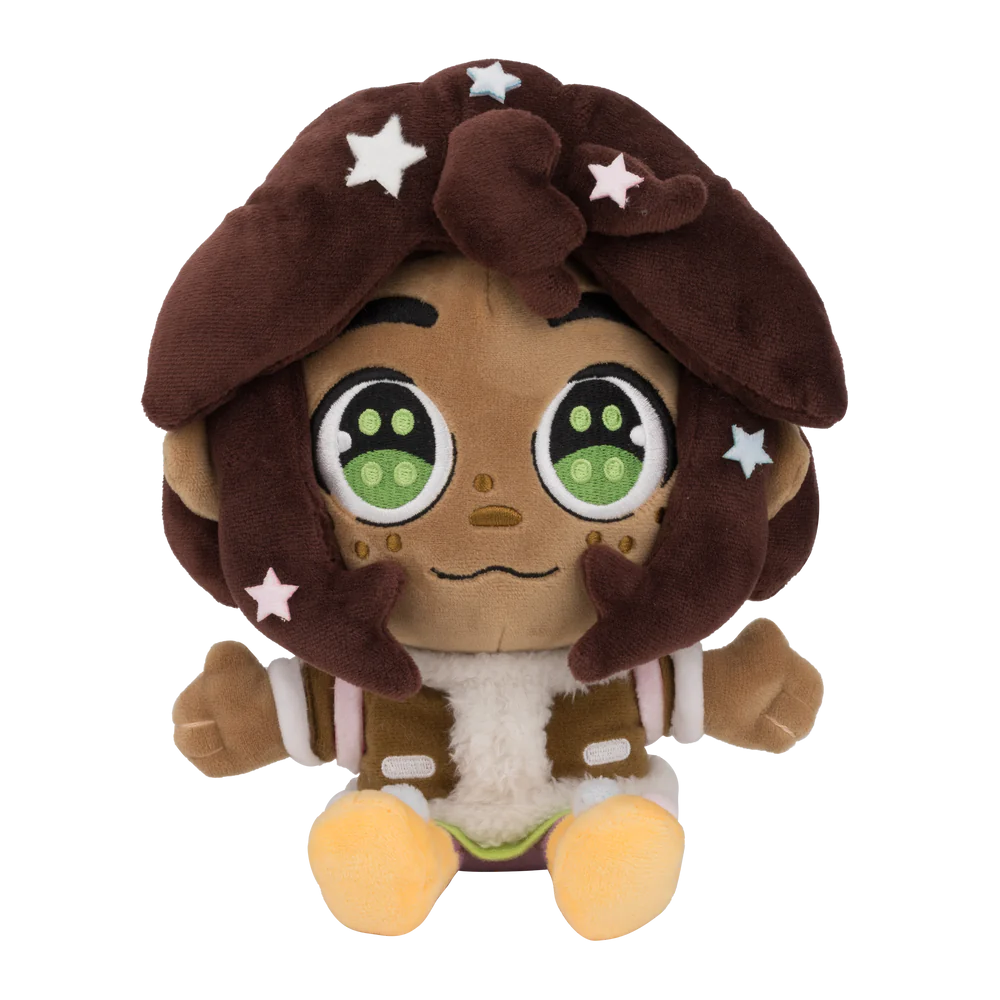
Molly’s arc continues pretty cleanly from where it left off in the original show.
Having been inspired by Giovanni to value herself more, she’s not as willing to let her abuse slide. Molly still doesn’t resist most of the time, but it’s a far cry from how she was at the start of the series. There, she was completely willing to lie down and let Mera take her epithet, but not anymore.
Not to mention that, in Chapter 7, Molly finally gives Lorelai a piece of her mind. She stops bottling up her grievances and it’s beautiful to see.
Molly is also more alive when it comes to her interest in bears. We already knew that she loved them, but she didn’t express it all that much. Only one brief line.
Fast forward to Chapter 12 of Prison of Plastic. In the middle of the final confrontation with the resurrected s’more dragon, Rick asks what a bear is. He’s from Ocean Country, so he doesn’t have any reference to draw from. Molly proceeds to passionately elaborate while slashing the monster:
“Bears hibernate during the winter to conserve energy! Some bears can even hibernate and rest up to eight months of the year! A joy that I have never experienced. Bears have two coats of fur! One for swimming, and one for having fur. Bears are strong enough to crush a bowling ball, and some of them can run up to forty miles per hour! What is the best bear? Trick question! It is all of them! Also, they are cute!”
I feel like a proud father watching Molly overcome her ingrained subservience, bit by bit, and reclaim her zest for life in the process.
Second is the first of the new characters: Naven! I don’t trust Naven.
GOD do I not trust him.
Naven is mostly calm and well-mannered in most of his scenes. The way he acts isn’t what makes me raise an eyebrow at Naven, not on its own anyway. Rather, it’s the Ebony Dark’ness Dimentia Raven Way chauffeur from Prologue D.
She’s a dead ringer for one Yoomtah Zing.
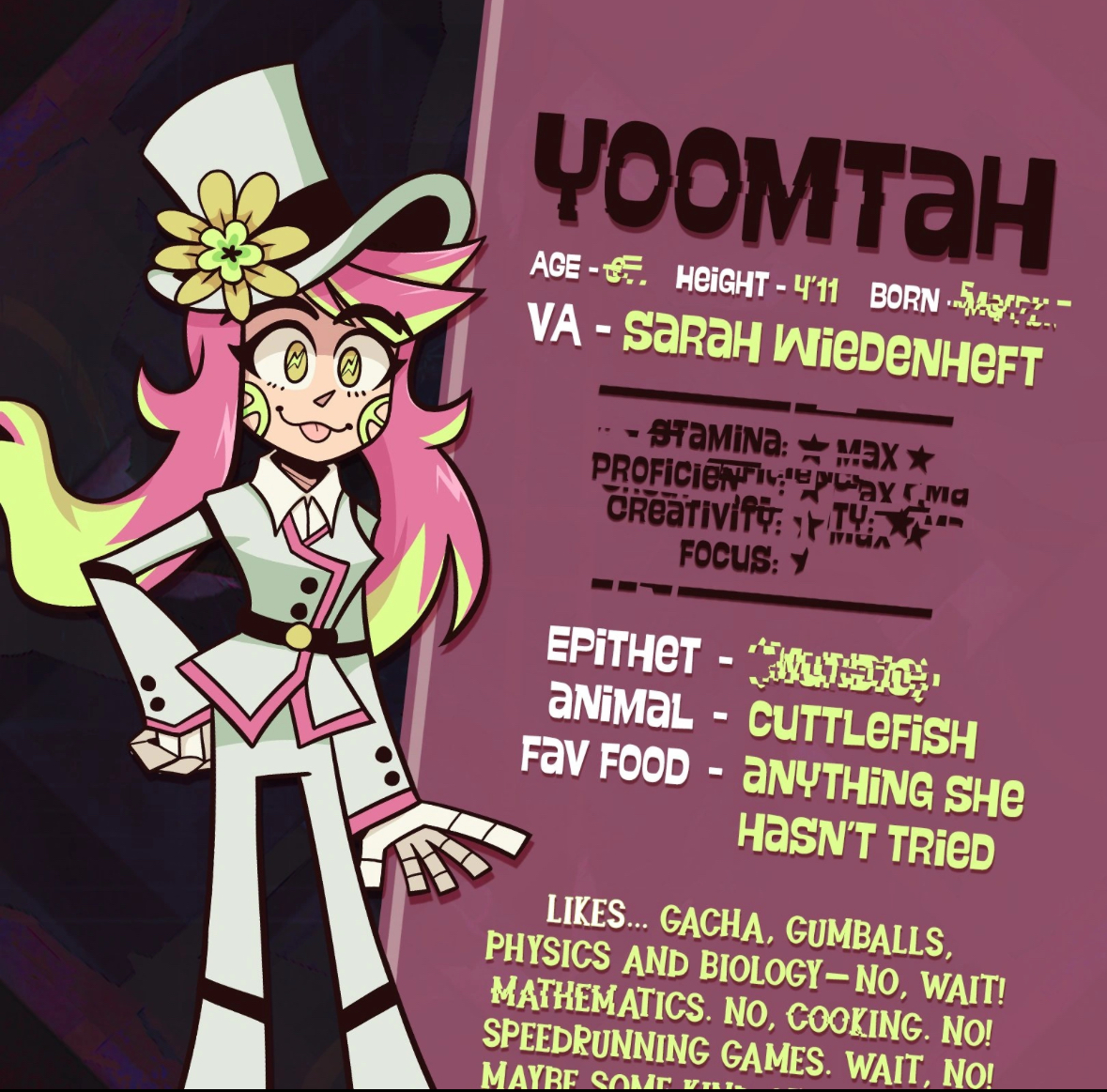
Here’s a comparison of the two, using Prison of Plastic’s official promotional art:
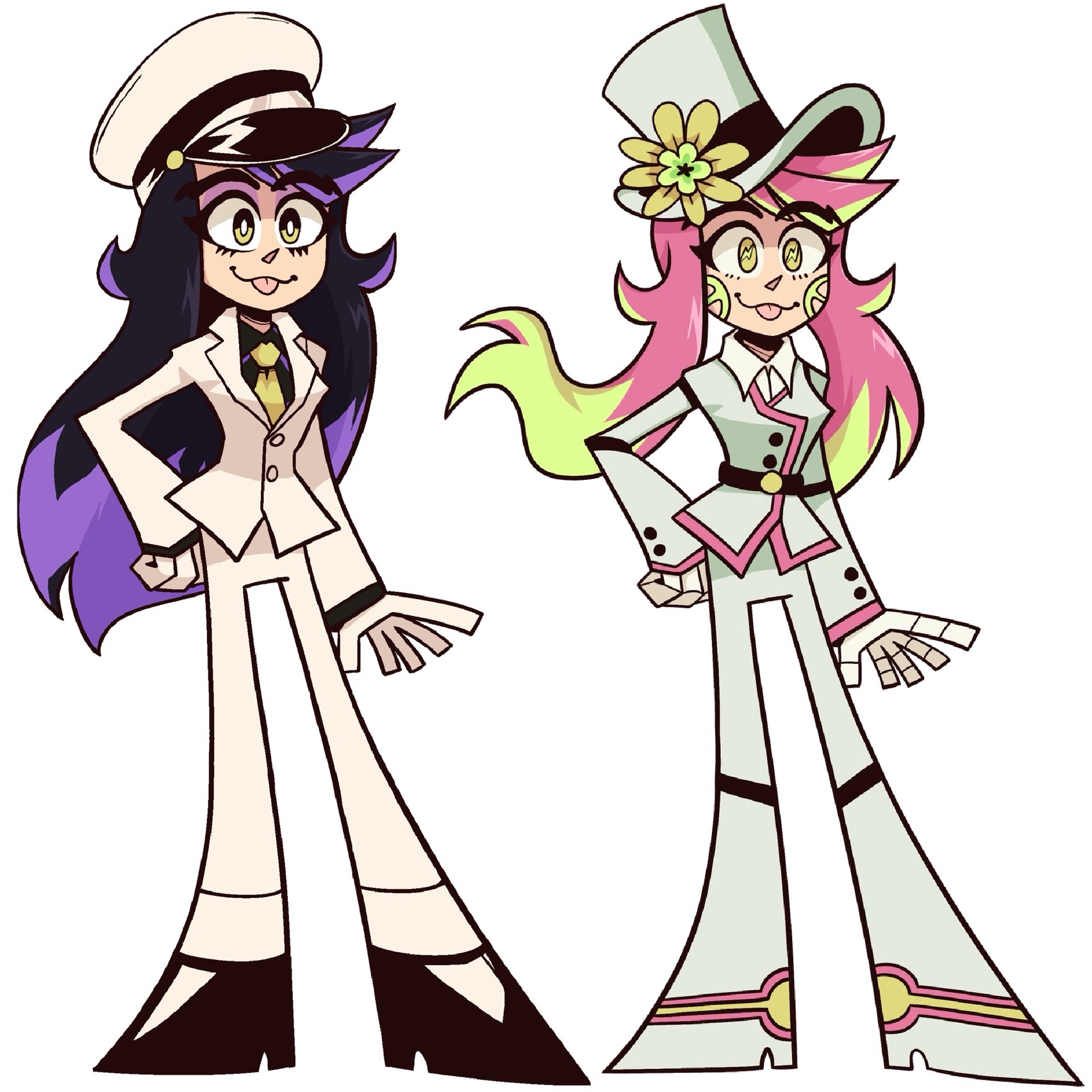
Yeah, they’re the same person lol. The pose, mouth, eyebrows, the shape of the highlights, the neck-level curls on both sides of and spikes of hair jutting out from under the hats sync up perfectly.
Well, the curls are a little bit different, but that’s not the point!
The point is that a member of Bliss Ocean, anti-epithet terrorist organization, is, on some level, connected to Naven. Although Yoomtah may be just one of his many at-the-ready chauffeurs, her being in such close proximity to him at all is a massive red flag.
Remember, Naven is acutely aware of the societal obstacles mundies face. He knows that they’re ignored, overlooked, and constantly fight to survive in a system that heavily favors inscribed. Few mundies have the resources he and Phoenica do, and for them, life is miserable. Naven does his best to provide jobs for the common man, but, inevitably, not everyone will want to work for STEM.
. . . Naven and Bliss Ocean have similar desires, don’t they? At the root, at least. They both want to dilute the weight epithets wield in society, for the sake of evening the playing field.
There’s one last thing to add to this. At the end of Prison of Plastic, when Ebony Dark’ness/Yoomtah reappears to pick up Naven, he says this:
“I didn’t mean to take so long. We got caught up in . . . well, it’s a long story. But I think you might find it interesting enough to justify the wait.”
With the knowledge that this is Yoomtah, the implication is obvious: They’re going to try and recruit Lorelai to Bliss Ocean.
Like Zora before her, Lorelai doesn’t want her epithet. It’s a burden, and a reason for her suffering. Lorelai and Bliss Ocean have common ground, and that gives the organization an easy in for her recruitment.
On top of that, Naven reminding Lorelai of the note-baseball is interesting. With him planning to recruit her, you’d think that isolating her more would serve that end. But he doesn’t. While Naven definitely has diabolical plans for Lorelai, it doesn’t seem like the twink is going to be cruel about it.
I, for one, am very excited to see where this burgeoning conflict is going.
Also, while looking for pictures of Yoomtah on my high school’s restrictive internet, I came across a Library of Ruina mod for her by a user named Bombardin2 on DeviantArt!
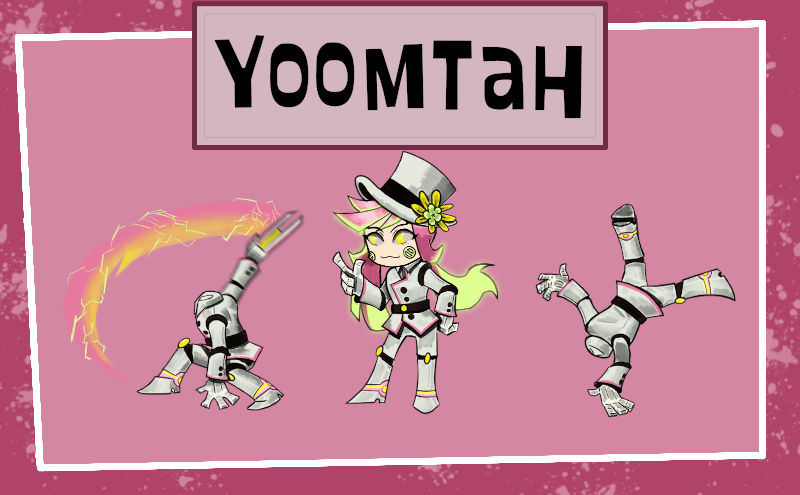
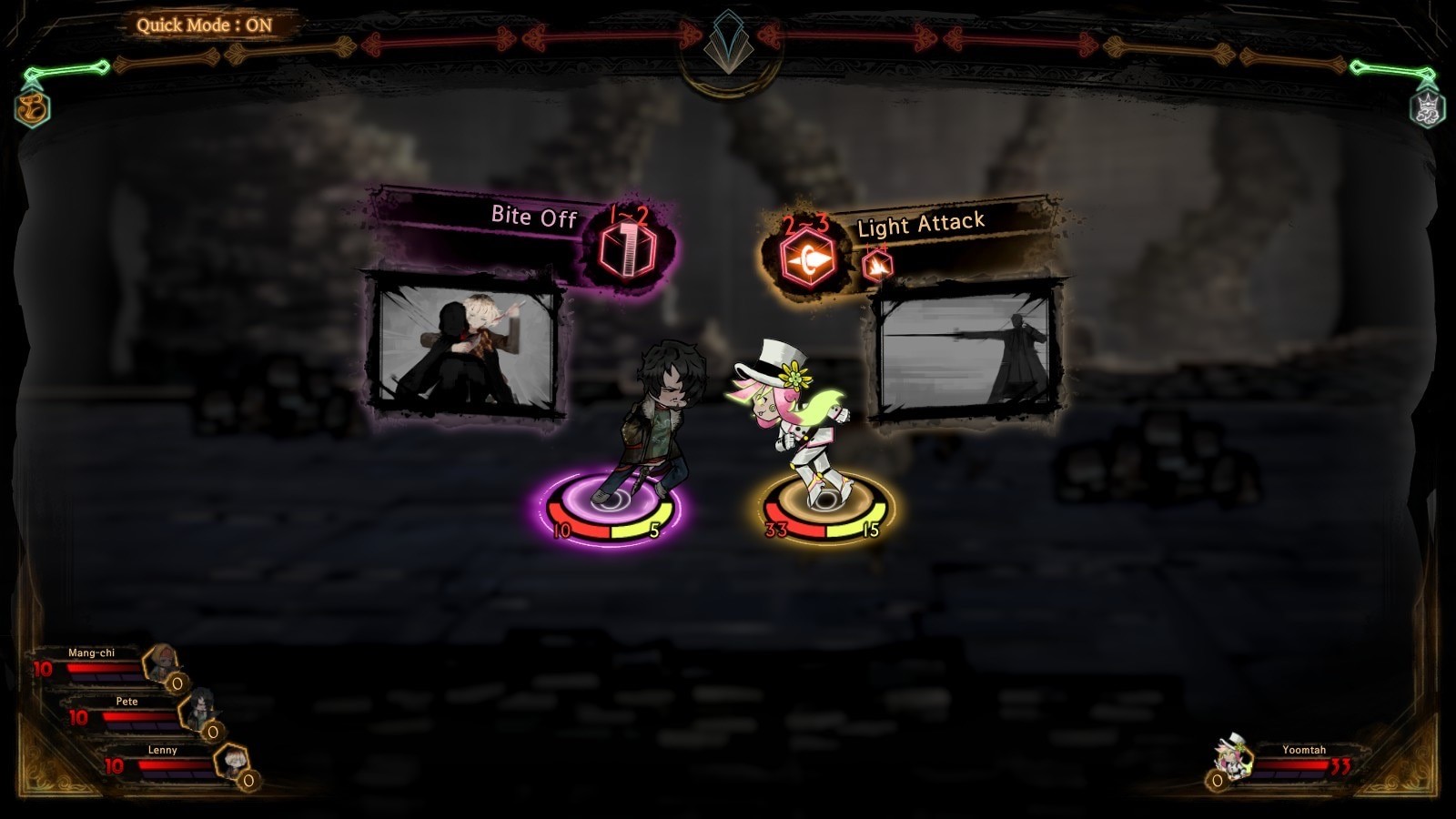
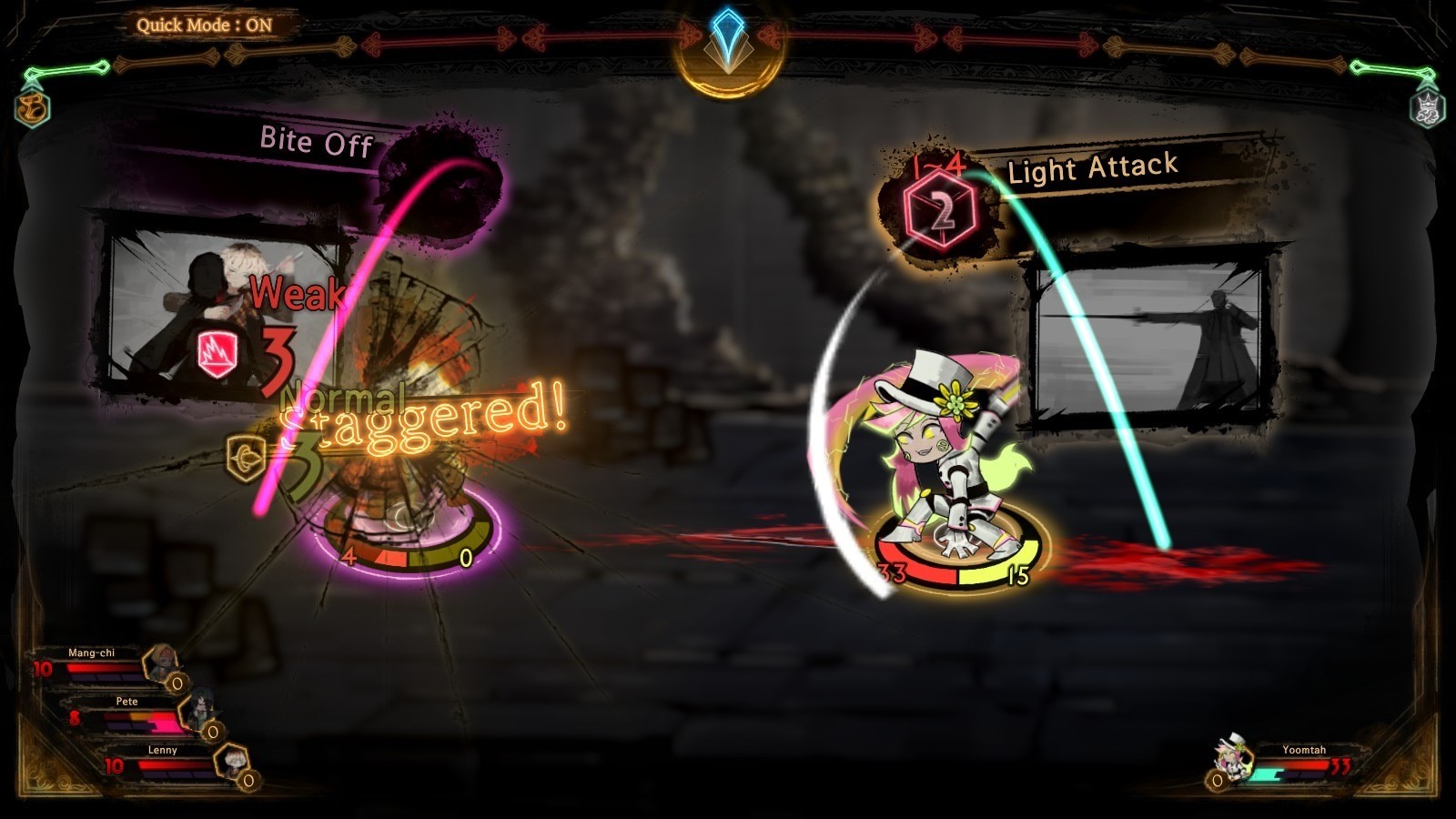
The Library truly will last on forever. Illuminated, solitary, infinite. Perfectly immovable. Filled with precious volumes. Useless, incorruptible, and secret.
But you know who isn’t useless, incorruptible, or secret? Giovanni!
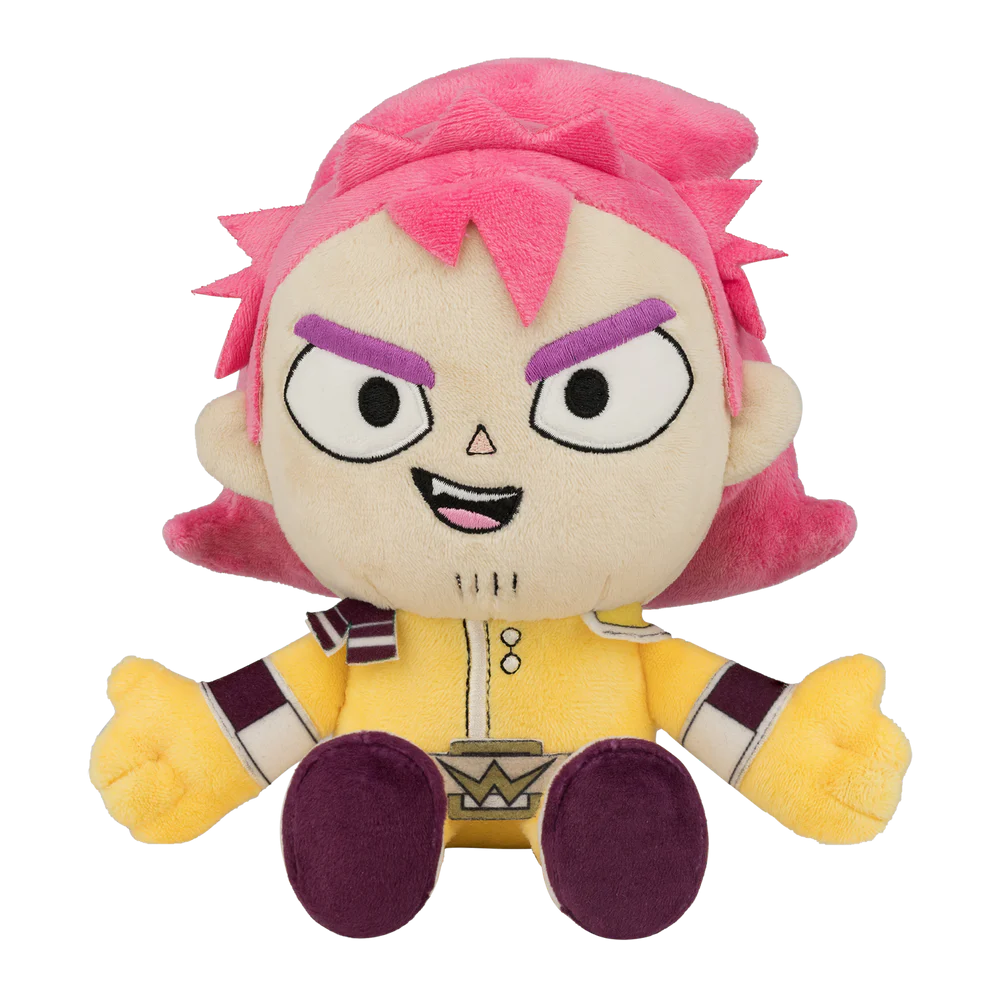
Giovanni is in a unique spot. He doesn’t really develop as a character, unlike the other returning protagonist does, we do get to see more of Giovanni’s outlook on the world. In the original show, he was a friendly Robbie Rotten who has a barely hidden caring side.
In Prison of Plastic, Giovanni performs that same role, just for Lorelai instead of Molly. However, since Lorelai is the story’s overarching antagonist—the villain—this relationship leads to Giovanni elaborating on what being a “villain” means to him.
“The most important trait that a minion can have is the willingness to lose.” He gestured proudly, like a member of a fraternity confidently stating their motto. “As a minion, it’s your job to try your best and to fail… most of the time! The bad guy doesn’t get to win. The bad guy’s job is to take the fall and look cool while doing it. And even though you lose, people like you the best. Because you’ve got the coolest costume! You get the coolest song! You have the best scenes! But in the end, everyone else gets to win. That’s … kind of the whole point.
“If you’re a good bad guy, then everyone has fun!”
The villain is an important role, yes, but it’s not really one with glory. Giovanni takes that in stride, however, because the things he does brighten the days of those around him, including those who defeat him.
Continuing, on Page 309: “Uh, no. I’m looking for minions who will do evil deeds, such as larceny. And repeatedly defacing hostile architecture until the local government stops installing it. There’s a big difference between being a bad guy and being a bad person. Y’know?”
“Evil,” in Giovanni’s mind, is making the world a better place. But it’s not for a reward at the end or clout. It’s to do good for those around you—and even those NOT around you, who you may never even meet—simply for the satisfaction of doing a good thing. Things don’t change if people remain complacent. But unfortunately, those who challenge the status quo are branded as villains, and have their goals intentionally misinterpreted by those in power. Giovanni accepts that branding with pride, reclaims it, and revels in it.
In a lighter tone, obviously, but that’s the gist. For the capitalist intersections that Epithet Erased is interested in exploring, I doubt it’ll go so far as to talk about anything too dark.
Speaking of dark, Trixie! They love dark things.
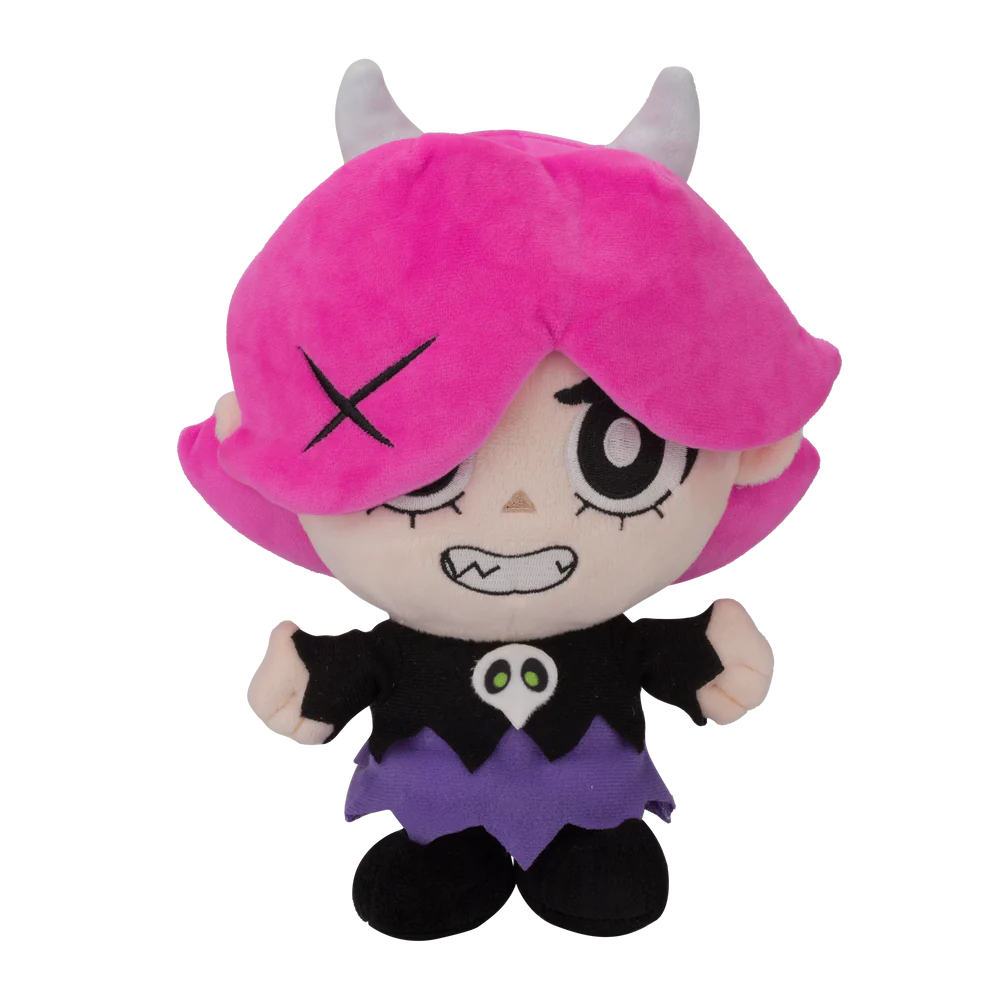
Trixie is a character that took some time to grow on me. At first, I liked them just by virtue of the charming way Prison of Plastic is written, but that would soon change. With a mix of self-defense mechanisms, shaky self-worth, and a desire for something they don’t know if they’ll ever have, how couldn’t she?
“Trixie was pretty sure that she had an epithet. Her friends agreed. With powers like hers, she had to have an epithet! She just . . . didn’t know what it was yet!
“Trixie was one of the many mundie kids who spent nights thumbing through the dictionary or looking up rare words online, checking if any of them sparked something in her. Adults told kids not to do that. It was basically impossible to look through every word and pay enough attention to each one to discover your power. But still, she had to try!
“She liked her power. She wanted to know what it was called.”
Trixie desperately wants their ghost powers to be an epithet. I mean, anyone would like to have an epithet of their own, obviously. Kids especially! Even disregarding the societal advantages epithets give, they’re magic powers that only you have! That’s awesome!
But it’s more than a simple want for cool powers or bragging rights for Trixie:
Having an epithet would ground her.
Trixie is far more fragile than their intimidating charade would have many of her peers believe. While she can pretend to be brave and scary, if someone sees through that act, then they’re powerless. If Trixie isn’t the strong one, the one that can protect Molly and Phoenica, then what does she have?
What makes Trixie Roughhouse worth being friends with in the first place?
But . . . an epithet? That would be something. No matter what it was, or what powers it gave Trixie. It would be something to justify being friends with the weird, quiet kid from a well-known criminal family who always sits at the back of the class.
Obviously, we know Molly and Phoenica would never abandon Trixie. She means the world to them. Trixie’s far more than just some hired gun. But, insecurities are never completely logical, are they? Many times, fear and anxiety completely overpower reason.
I like Trixie quite a lot. I wouldn’t say they’re my favorite new character, but that just goes to show how stacked her competition is.
There is one character who is definitively not in the running, unfortunately.
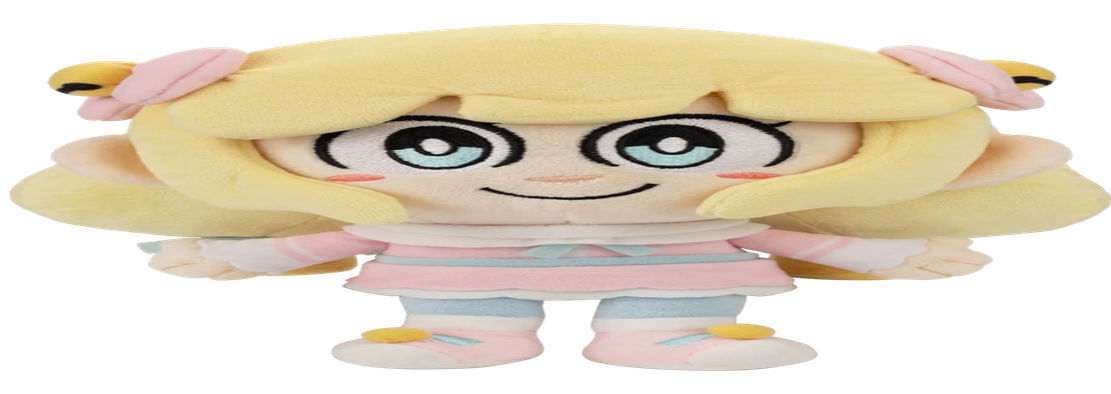
Phoenica is really a nothing character for me.
For as funny as she is, and for as sweet as her friendships with Molly, Trixie, and Rick are, the final member of the Neo Trio has very little sticking power for me. She’s a comedic relief character first and foremost, and she does a great job at inciting The Chuckles. Phoenica does her job well!
However, she doesn’t have the depth of character to really be anything more than that.
I don’t dislike Phoenica, but I don’t particularly love her either.
Especially when there’s another comedic relief character who does have that kind of depth of character: Rick!
Or, rather, Toidei “Odi” Gourami.
. . . he doesn’t have a plush as of the time of writing so I can’t put one here sorry.
On the surface, Odi seems to share a common ancestor with Giovanni character-wise: they’re both loud, over-the-top villains who mean well. There absolutely are differences between the two—like how Giovanni is strangely charming with his exaggerated demeanor, while Odi is charmingly strange in the best way—they’re still rather similar.
On the surface.
Giovanni is just like that. He’s just a silly guy.
Odi is certainly silly and a guy, but there’s more to it than just that. After years of being trapped in He Who Hungers Endlessly’s Colosseum, Odi had to create the Rick Shades persona. It was a survival tactic. It was easier to be the weird but . . . entertaining fighter and smile through the pain, rather than agonize over his sorrows.
Denial is the word of the day.
Even after he opens up to Molly about his trauma, even after she puts together that his friends didn’t abandon him, Odi still struggles with his identity. He continues to dip into Rick Shades. Which, as sad as it is—when the guy isn’t making me smile with his antics, anyway—definitely feels right. It’s like Cady Heron in Mean Girls, if I were to compare it to anything: at what point is Odi just playing the role of silly guy character Rick Shades, and at what point is that “character” simply who he is? Where is the line drawn, after so long?
It’s the logical conclusion to the “fake it ‘til you make it” idea that Trixie presented.
But things are looking up for Odi. He let the floodgate open with Molly, after all, even if it was just for a few minutes. That shouldn’t be cast aside.
Odi/Rick is a great new addition to the cast. He’s wonderfully entertaining, in a way that’s different enough from Giovanni to be fresh, but he doesn’t slack in terms of being a well-written character. And that’s not even bringing up Ray Chase’s vocal performance in the audiobook, which I will, because it’s everything.
A character like Odi/Rick needs an exceptionally animated cadence to come off accurately, and Ray Chase pulls it off flawlessly.
While we’re here, Prison of Plastic introduces in-universe powerscaling: a point-based proficiency system. Being a way to determine the aptitude an inscribed has with their epithet, it comes up a few times, namely with He Who Hungers Endlessly and Lorelai.
For HWHE, it’s the reason why he runs the Harvests with the Colosseum: to obsessively climb to higher and higher numbers. Apparently, this proficiency system is so intensely ubiquitous that even the isolationist Ocean Country uses it.
It gives HWHE a lot of characterization, even though he never once appears in Prison of Plastic.
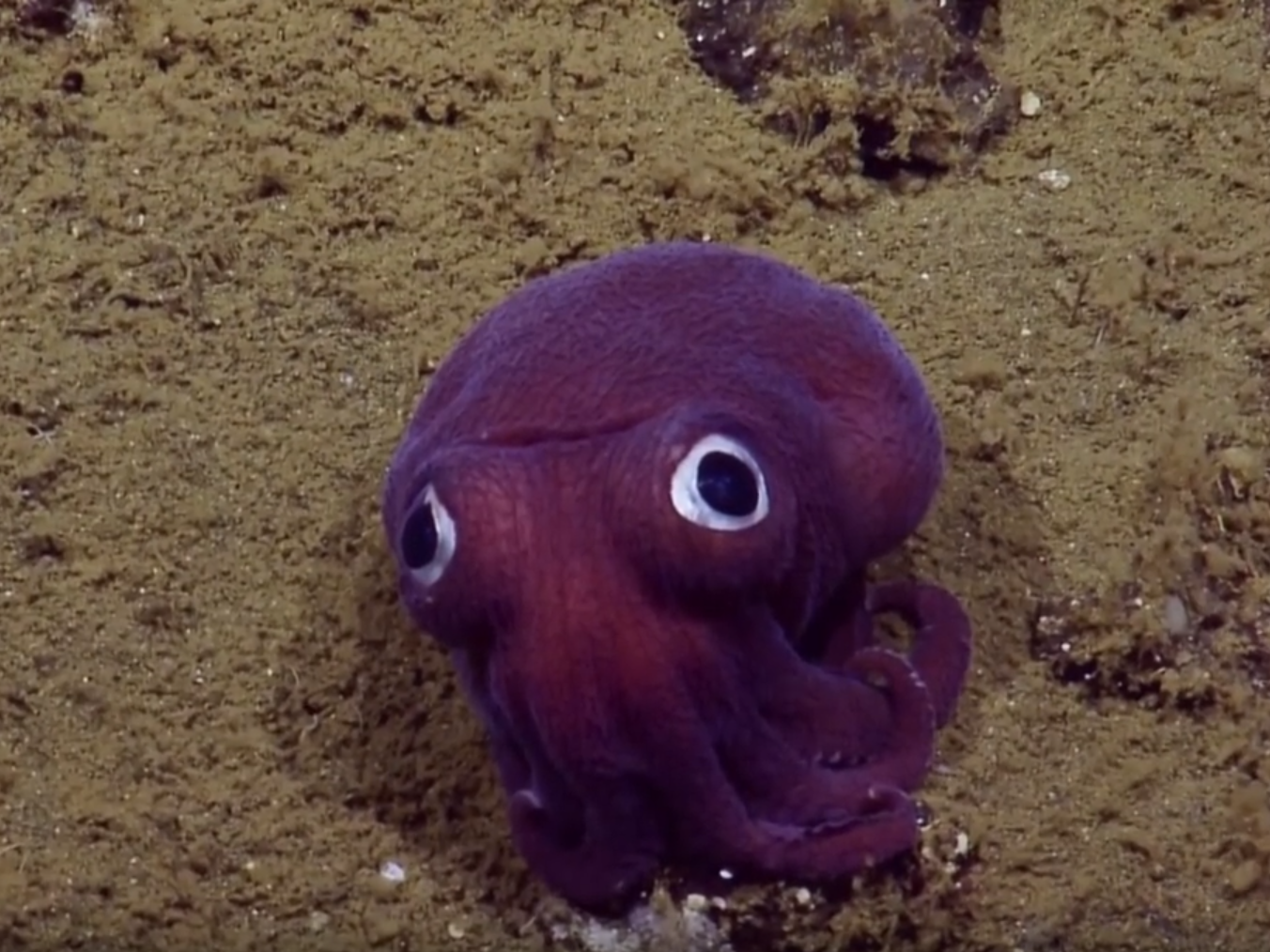
I choose to think he looks like this!
For Lorelai, the point system serves to supplement how tremendously powerful her epithet is. According to page 254, it’s “in the high sixties,” a true feat for someone so young.
It isn’t ever cited as justification for why Augment is so insane: it only furthers our understanding.
Something that I like about this, at least in Prison of Plastic, is that this point system doesn’t impact how the novel’s fights play out. It causes conflict between characters, but nothing further than that. It doesn’t go the boring route of having the guy with the bigger number always win. If it did, Lorelai would just steamroll the protagonists, and that story would suck.
Speaking of, it’s high time that we talk about her. Lorelai is the last character I really want to highlight in this article, and I left her for last for a specific reason.
I resonate with her a lot. More specifically, the severe social withdrawal/hikikomori aspect of Lorelai’s character, which is a massive part of her.
. . . My freshman year of high school was 2020, and I chose to do online schooling. I think that’s all you need to get the picture that these wounds are fresh, and that tackling Lorelai is something I’m a bit scared of.
Let’s get into it.
Trigger warning and content warning: intense discussion of severe social withdrawal, debilitating escapism, and self-destructive behavior. If you’re not in the headspace to tackle these topics, please do not read any further.
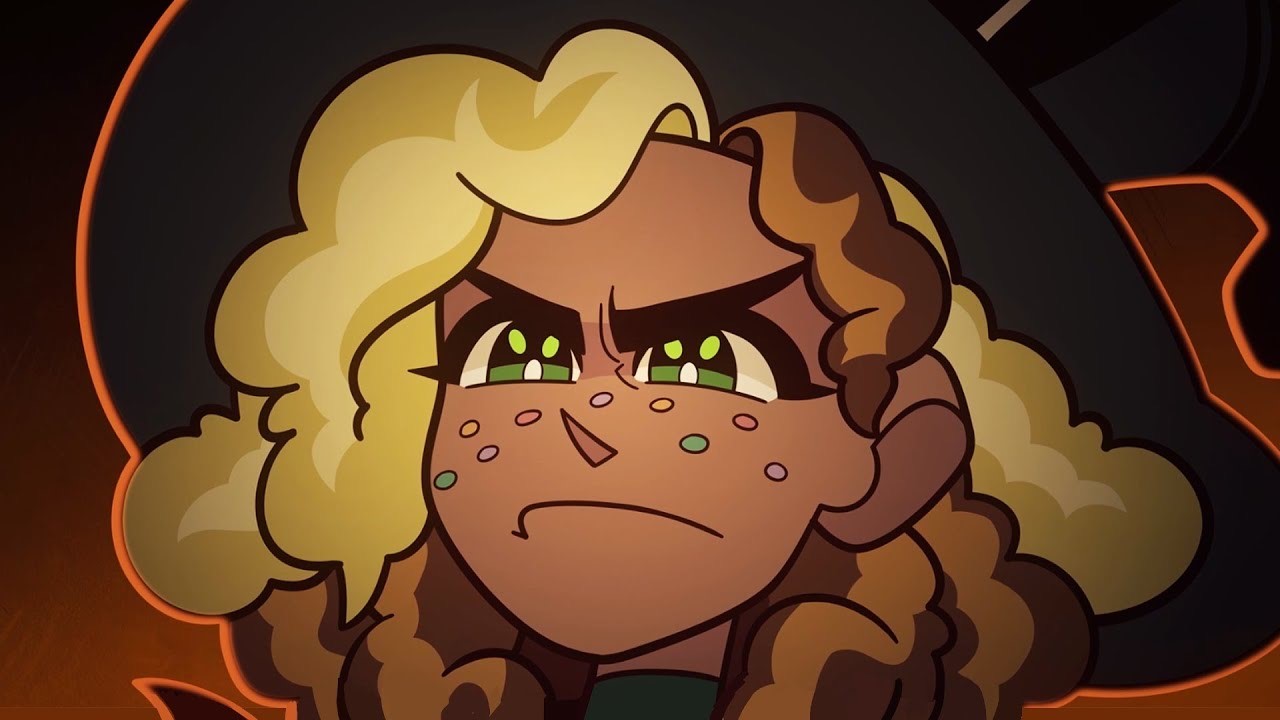
Right from the start, I clocked the dream bubbles as a very literal stand-in for the kinds of things people use for escapism. Lorelai uses them to escape from the real world—her sister, her responsibilities, and her lack of friends. It’s so blatant of a metaphor that it’s barely a metaphor anymore.
A real-life example of the dream bubbles would be media like TV, movies, and video games.
Since Lorelai has no friends, she has no reason to leave the house. There’s no one to spend time with. She may go to school, but Lorelai’s world doesn’t extend beyond the lot the Blyndeff Toy Emporium is built on. There aren’t any factors that could induce variation in her life. There’s nothing stopping her from just retreating into a dream bubble, completely disengaging from the outside world.
There’s nothing out there for Lorelai.
Contrast the real world with that of the dream bubbles: worlds with no bounds where logic doesn’t matter! Worlds where Lorelai can do whatever she wants, make friends who love her! Worlds where they can all go on whimsical adventures to lands unknown that solidify their friendships!
Worlds . . . that are fake. Worlds that Lorelai controls all aspects of.
Worlds where Lorelai is completely alone.
“She hated this feeling.
“She hated it more than anything in the world, and she felt it more often as she got older. She thought that she could fight it if she constructed bigger worlds. Better ones, ones with more colorful characters and wider horizons. But no. No matter the depth and intricacy of the painting, it was still flat. Room temperature to the touch. No matter what she did, her characters felt less and less like actors she was performing with and more like hollow puppets.”
You can’t substitute real human interaction with media. Real relationships—real love and real care and real emotional connection between people is something you verifiably cannot replace.
Media can’t love you. It can’t care about you. You can’t have in-jokes or groan about your frustrating classes with it. You can have emotional connections to a piece of media (just look at how Library of Ruina irreversibly changed the course of my life) but that piece of media can’t reciprocate.
Lorelai’s constructs will never be able to genuinely console her.
Something that’s brought up a couple of times is that Lorelai never recycles concepts for her dream bubbles. While Lorelai will almost certainly insert herself into the starring role, not a scrap of one world’s concepts will be used in the next.
New things are distracting, plain and simple. They catch our attention, and they can hold it for quite a while. Especially if they’re something interactable and lengthy, like an RPG such as Persona.
That distraction’s hold on you will eventually wane, though. Nothing lasts forever. That’s just a fact of life, as hard as it is to accept.
But . . . you can replicate it, can’t you? You can just find a new thing to distract you, right? And when that thing loses its luster, you can find another thing! You ravenously shovel piece of media after piece of media down your throat, never once tasting your food. Because if you did take the time to taste, you wouldn’t be able to eat as fast. You’ll stop being distracted.
Lorelai can’t afford to slow down. Her bubbles have to always be new, new, new.
Then there’s Martin. A parent who, Lorelai would argue, is fine. Nice, even!
Because he leaves her to her own devices and enables her.
A parent like Martin is deeply neglectful, but . . . isn’t that better? If your parent is active in your life, they’ll rip you out of your distractions. Force you to engage with the real world, even if only briefly. They trample over your escapism.
But a parent who doesn’t take the time to be involved? One who buys you more media to escape into?
That’s perfect!
They leave you alone! They respect your decision to escape reality! They don’t try to rip you out against your will, they don’t try to get you to engage with the real world, they don’t try at all! They let you sink, until the water pressure crushes your lungs, and you drown.
“Molly never wanted to play along. Molly never cared about all the time Lorelai had spent designing things. She just came in to bother her. To yell at her. To make her do chores. To pick up a shift or help out at the counter because the store was busy. Her dumb little sister was absolutely no fun at all!
“Her dad understood though. He was proud of her creativity and encouraged it, taking ideas from her worlds to make new toys.
“He was always nice to Lorelai and didn’t mind if she took some time off.”
Lorelai’s one and only role model doesn’t care about her suffering, how she’s growing more fragile by the day. He uses her worlds as inspiration, so why not encourage her to keep doing this?
After Martin comes Molly. The stupid kid whose epithet can force her way into the dream bubbles, invalidating hours of careful dream bubble designing. And for what?! To get Lorelai to do stuff? To complain about x/y/z that’s apparently Lorelai’s job to deal with?
Siblings like that are annoying, aren’t they?
If they really cared about you, they would just leave you alone. Like your parent does.
But you still love them: you’re still siblings, and you always will be. You still have a lot of happy memories together, from before everything went wrong. Those were real, and they were nice. You desperately want to go back to that. Back to the times before the world was turned upside down, when you weren’t so petrified by the mere notion of social interaction.
Lorelai wants to have a good, loving relationship with Molly. She just doesn’t know how.
Though Martin and Molly are definitely the main people in Lorelai’s life, her classmates are a part of this as well. Their role is just more passive.
“When the feeling of being surrounded by plastic became too much for [Lorelai] to take, she would leave her bubbles and walk around the toy store, but that lonely feeling didn’t go away. She was too weird for the kids at school. She had to transfer from her old high school after the fire forced them to move. She lost all her old friends and new ones were too hard to make. How could you ask someone to dive headfirst into an immersive adventure with you before you really knew them?
“The more she looked at her classmates leading happy, normal lives, the further away she felt.”
Your classmates are a glimpse into what you could’ve had. They’re happy, all the time, always making the most out of life without a worry in the world.
You know they have their own share of struggles. Like, obviously. The way they act in school, around their friends, is not representative of how they act at their lowest.
But that thought is overpowered by your envy.
You start looking at the timeline of your life and compare it to theirs, as though the two timelines were compatible. Specific dates are the best and hurt the most. What were you doing, the night they went to the school dance? Or on Halloween, when they all got dressed up for a night out on the town together?
You don’t need to strain yourself trying to remember to know exactly what you were doing that day. You already know.
You were pathetically languishing in your own misery, alone, as your classmates went out there and seized their own happiness.
If they could do it, why couldn’t you? You’re all the same age. What’s the difference?
. . . It’s not even really about them, the person. You don’t know them, and you’re too scared to try. But you know what they look like. And that’s enough to imagine all of the happy moments they must’ve had to hurt yourself with.
You’ll never get those years back, and it’s your fault for not rebounding better.
Lorelai can’t make new friends. With Molly, there’s at least a past connecting them. But with her classmates, there’s nothing.
And the worst part of all of this? Augment is only getting stronger, to the point that Lorelai can barely keep the reins on it.
“ ‘The more I use it to hide away, the stronger it gets. I was in control when I was little, but now the worlds just exist on their own. And they just . . . go on and on, and I don’t know where! I don’t know where…’ ”
As you continue indulging in escapism, its stranglehold on you grows. It becomes habitual. It’s easier to go home and play a game or watch a movie by yourself than to go out and do something, right? And you keep doing that. You keep choosing to go home and isolate, rather than do anything else.
It’s like quicksand.
At first, it’s nothing too big. Just a day or two where you spend time by yourself. But, over time, it snowballs until it swallows you whole. Then it’s five, six, seven days a week where you just . . . go home. Nothing more.
Augment getting stronger is a way of illustrating that.
This kind of chronic escapism snowballing doesn’t just happen on its own. Something big needs to happen to trigger that. In my case, it was a combination of not having many friends in middle school and suddenly being thrust into the COVID-19 pandemic.
In Lorelai’s case, however, the trigger was Calliope Blyndeff’s death. The source of the fire that took her mother’s life was never identified, as if it had just spawned out of nowhere.
As if someone had, oh, I dunno, magically willed it into reality? With, say, an epithet?
“Was it her?
“Had she been inscribing in her dreams? It wasn’t uncommon. Her parents had found her doing it before, marching through the kitchen with a parade of singing mice behind her, fully sleep-walking. Shouting nonsense in knight’s armor while looking for the bathroom, completely unconscious. One time she caused a small earthquake and she didn’t even know it.
“She was in a dream bubble that night.
“Had she dreamed the fire into existence?
“Was it her fault that their mother was gone?”
No. No, it wasn’t. It was a sudden tragedy that no one could’ve seen coming, least of all a preteen. It was something that you had absolutely no control over. Everything was out of your hands. There was nothing you could’ve done. It was not and never will have been your fault! And you know that. You know that better than anyone else.
. . . that doesn’t stop you from reviling yourself, though.
Lorelai will continue to blame herself for letting this happen. For not trying harder when it was important, for becoming a recluse in response, and for wasting years of her life playing pretend in her dream bubbles.
All of this comes to a head in chapter 12 of Prison of Plastic. Where everyone besides Naven—Molly, Phoenica, Trixie, Rick, and Giovanni—all merrily work together to defeat Lorelai and her resummoned s’more dragon.
There’s this . . . magical feeling to the whole climax. The prose from our girl is so heartwarming and I feel her so much, and I’ll just let you read some of it because it speaks for itself.
“Lorelai watched from above as Rick and her sister ran through the scattered dragon parts like lawn mowers. She was losing. Badly. But . . . for some reason? She wasn’t upset. Those two were enjoying themselves. She hadn’t heard Molly dork out about bears like that in . . .
“ . . . gosh, a long time. A really long time.
“Her little sister was smiling.”
“The witch began to laugh. A triumphant, evil laugh! The laugh of a witch that cooked kiddos into cookies and then didn’t share those cookies with her evil witch friends! “Muahahaha . . . Ahhh hahahaha-hahaha! HAHAHAHAHA!””
“She smiled.
“All right. This would be enough for now.”
People are wonderful. People can love you from head to toe, care about you in ways you can’t yourself. You can make in-jokes together that bring a smile to your face and confuse people who don’t get it, and they’ll be there for you when you need to groan about your frustrations.
No media or dream bubble escapism can ever match that level of real emotional connection.
But then, just when things are looking up, Lorelai is ripped out of that warm joy. She’s given a cruel reminder, as the s’more dragon both hurts Molly and destroys the tower Naven was left in.
“Real connections could break.
“Real connections could burn.”
The characters in Lorelai’s dream bubbles may not be able to love her. They may not be able to comfort her the way that real people can. She knows that.
But you know what they’re also not able to do?
Their feelings can’t be hurt. Lorelai can’t scare them away by coming on too strong, or lose their attention by being too distant. The dream bubbles are safe. Lorelai never needs to worry about destroying her relationships with the characters in them. She can program them to love her against all odds!
And if worse comes to worst, Lorelai can just snap them out of existence and make new ones where they stood!
To try to break out is to risk being dragged back in, with its grip on you being so much tighter than before. Because you tried, didn’t you? Who’s to say that all of your future attempts won’t crash and burn like this one? Everything else in your tiny world continues to repeat predictably, so why exactly would this be any different?
It gives you ammunition to use against yourself.
You know how your brain works.
While talking to Naven, everything comes out in a slurry of tears. Lorelai confesses that she can’t bear to think the fire was her fault. She doesn’t think she’s worthy of the rabbit hoodie Calliope hand-sewed just for her, the one that goes with Molly’s bear hoodie. She’s lost control of Augment, and she wishes she could have even the chance to get rid of it.
Lorelai despises her epithet. It has taken so, so much from her, and, and—
Lorelai just wants to be normal, dammit!!! To be like her classmates, happy and healthy and living their lives without a weight constantly threatening to pull them under! She wants friends, like she used to have before the fire, like Molly has now with Trixie and Phoenica and Vincent and Rick! To have her mom back so everything can go back to how it used to be!
At the end of the novel, Lorelai and Molly don’t reconcile. Lorelai, as she’s always done, runs. She hides in her room, trying to hold herself together.
Naven, before Ebony Dark’ness/Yoomtah drives him, Trixie, Phoenica, and Rick off, reminds Lorelai to “Check her pocket.” Something very, very important is in there, and Naven wants to make sure she doesn’t forget about it.
“[Lorelai] reached in and pulled out Vincent’s calling card: a baseball with something written on it. She couldn’t quite make it out in the dark, so she flicked open her hand and glowing light from her palm illuminated the object like a book lamp. It was a brand-new ball with red stitches and matching red letters scribbled all over it. The same handwriting as his recipe.
“It said:
“ ‘Hare-idan, I had a lot of fun today! I hope that one day you’ll decide to change because I’d love to have you on my team!’
“An arrow pointed around to the back side. A phone number had been written there with excited evil smiley faces drawn next to it.
“ ‘Call any time if you want to get better at being bad. ›:D’
“—Giovanni Potage”
Giovanni is reaching out. He wants Lorelai to improve and overcome her struggles. Not because it would be easier to deal with her that way—like Lorelai might assume if Molly were the one doing this—but because he cares. Giovanni sees that she’s hurting, and he wants to help.
But he also knows that he can’t force her. Dragging Lorelai out of her escapism only causes her to withdraw into it more.
So, Giovanni makes the offer, with all the best intentions, but leaves the final decision up to Lorelai.
But, with Naven and Yoomtah simultaneously eyeing her for Bliss Ocean, her future is uncertain.
Two paths lie outstretched for Lorelai: a genuine friendship with Giovanni, but one she’ll have to forward herself, or employment for Bliss Ocean, something Naven and Yoomtah will instigate.
The good choice is apparent. Seeking out a friendship with Giovanni, potentially reconciling with Molly in the process, would be best for Lorelai. She’ll have to be proactive in her life, and, speaking personally? While that is a petrifying thought, it’s also really empowering. You start taking control, instead of letting your escapism run your life.
But that’s so hard. I’ve only really started doing that this school year. Senior year, my very last one.
And if Lorelai went with Bliss Ocean instead, she wouldn’t have to be proactive. Naven and Yoomtah or whoever else would be saddled with doing that, not her. Lorelai wouldn’t have to put herself out there. She can just . . . let it happen to her. Even if the people or person is just using you—like Bliss Ocean would absolutely do to Lorelai—it’s easier than staying alone.
Lorelai is my favorite Epithet Erased character. She resonates with me so strongly that there was never any competition by the time I got to the end of the book. She’s the culmination of everything in Prison of Plastic: Molly’s grievous neglect by Martin, Trixie’s need to prove themself worthy of love, Rick/Odi’s isolation, Giovanni’s ideals of villainy, uhh Phoenica’s fear of mundane things ig.
All of that, rolled up into an emotionally unstable wrecking ball with godlike powers.
Is Lorelai horrible to Molly? Absolutely, and that shouldn’t be glossed over. But I still think she deserves sympathy.
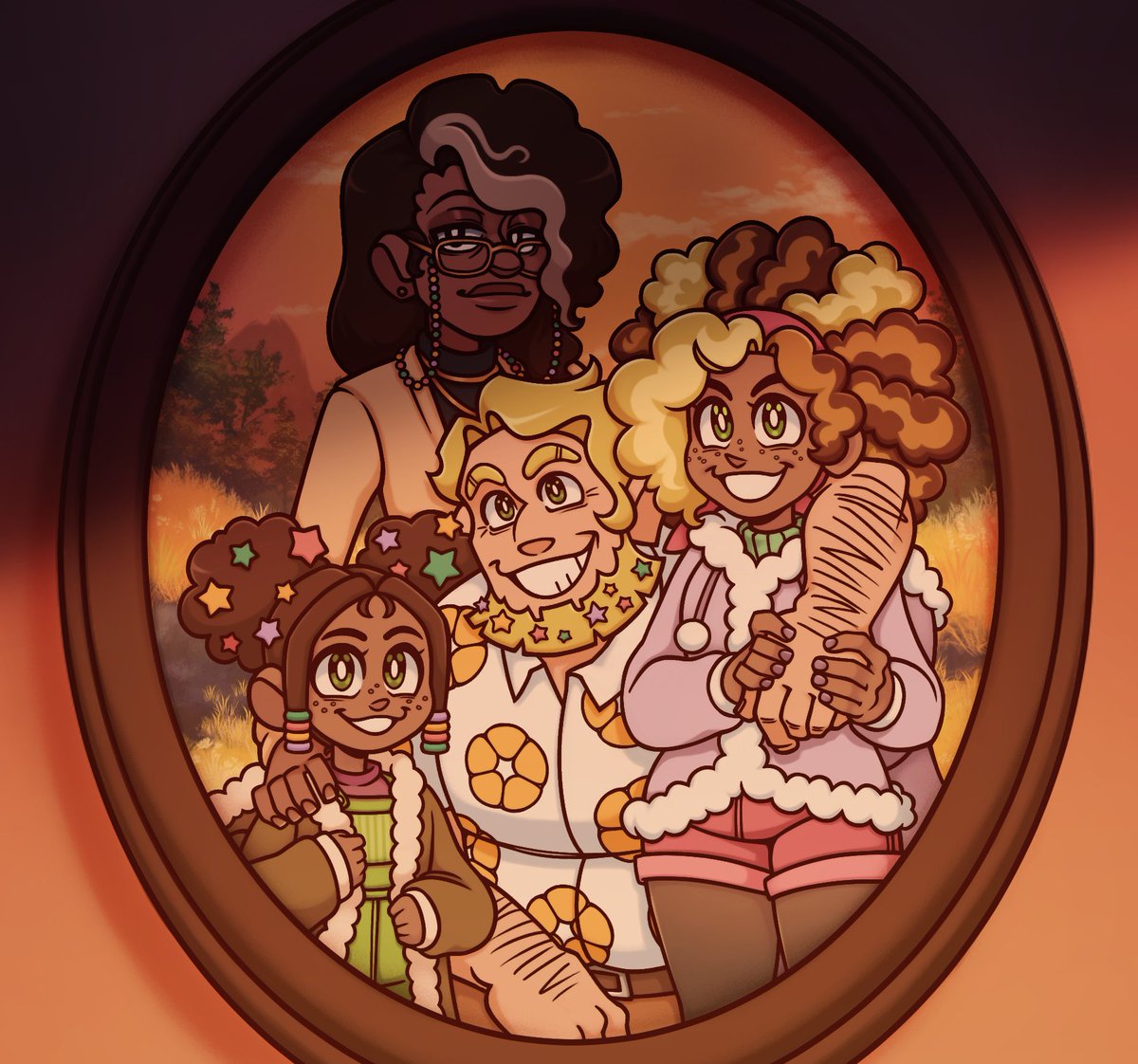
It’s funny. This article was supposed to be a break from my heavier articles. A nice little diversion to get my mind off things.
If you know me irl, you’ll know that this article has taken a big toll on me. Blood, sweat, and, God, so many tears went into this. I’d stop over and over in the middle of my assignments to go hunch over a trash can to dry heave. I felt like I was just going to shatter into a hundred thousands of tiny, little pieces.
I was picking at a wound that had only barely scabbed over. And in doing that, I forced myself to confront a lot of things I’ve repressed over the years. All traumas are connected, even if they don’t seem related at all.
I don’t think I was ready for this article, if I’m being completely honest.
If there’s anything to take away from this article, beyond that Prison of Plastic is really good, it’s that you should take care of yourself. Give yourself time to process your trauma: don’t be like me and hack them open for all the world to see. Trauma takes years to recover from, and you shouldn’t, by any means, rush that process.
Go Bengals!


